
60 minute read
Under the Oaks
Amy Coney Barrett ’94 Confirmed to the U.S. Supreme Court
Rhodes College alumna Amy Coney Barrett ’94 will serve on the Supreme Court of the United States.
President Donald Trump nominated Barrett on September 26, 2020, to be an Associate Justice. After the nomination was considered by the Judiciary Committee and reported to the United States Senate, the Senate confirmed the nomination on October 26, 2020.
After taking the oath of office, Barrett is the 115th justice and the second Rhodes graduate to serve on the Supreme Court. Abe Fortas of the Rhodes College Class of 1930 became an Associate Justice in 1965.
“Justice Amy Coney Barrett’s confirmation puts Rhodes College in the front ranks when it comes to having undergraduate alumni on the U.S. Supreme Court,” says Dr. Timothy Huebner, associate provost and
the Irma O. Sternberg Professor of History, Dr. Timothy Huebner. “During the last 60 years, since the Kennedy administration, Rhodes has had two of its alumni end up on the highest court in the land. Only Stanford (with four), Harvard, and Princeton (both with three) have had more undergraduate alumni serve as justices during this time.”
Rhodes has a long history of connections to the Supreme Court. Alumni have clerked for justices and currently serve as federal judges, and Rhodes has hosted both the late Associate Justice Antonin Scalia and Associate Justice Stephen Breyer on campus. Rhodes alumna Allison Bruff ’14 is a 2020-2021 Supreme Court Fellow.
“At Rhodes College, we set our graduates on a path to professional success at the highest levels. Being confirmed to the Supreme Court, Judge Amy Coney Barrett is part of that legacy,” says Rhodes College President Marjorie Hass.
In the Rhodes tradition of active civic discourse and engagement, alumni expressed both opposition and favor of Barrett’s nomination, and in a recent letter to students and alumni, President Hass said, “Rhodes is an institution devoted to excellence in the liberal arts and sciences; we are fundamentally committed to inclusion, belonging, and respect for all persons.”
Dr. Jennifer Brady, Rhodes professor emerita of English, reflected, “Amy Coney was a stellar student and an award-winning English major during her impressive undergraduate career at Rhodes.” Barrett graduated magna cum laude with a bachelor of arts in English and was selected by fellow students to be inducted into the Rhodes Student Hall of Fame. In addition, Barrett was a member of Kappa Delta Sorority, participated in Model United Nations, served as a resident advisor, and was elected to serve on the Honor Council.
While a student, Barrett was recognized for her academic accomplishments, including induction into Phi Beta Kappa, Omicron Kappa Delta, Mortar Board, and the Sigma Tau Delta English Honor Society. She also received awards for “Most Outstanding English Major” and “Most Outstanding Senior Thesis.”
After graduating from Rhodes, Barrett attended law school at the University of Notre Dame and graduated summa cum laude and the number one student in her class in 1997. She clerked for Judge Laurence Silberman of the U.S. Court of Appeals for the District of Columbia Circuit, and then for Supreme Court Associate Justice Antonin Scalia.
Following her clerkship for Justice Scalia, Barrett joined the Washington, DC, law firm of Miller, Cassidy, Larroca & Lewin. In 2002, she joined the faculty at Notre Dame Law School, where she was named a professor of law in 2010. Barrett was confirmed as a judge on the United States Court of Appeals for the Seventh Circuit in October 2017.

President Donald Trump watches as Supreme Court Justice Clarence Thomas administers the Constitutional Oath to Amy Coney Barrett on the South Lawn of the White House in Washington, Monday, Oct. 26, 2020, after Barrett was confirmed by the Senate earlier in the evening. (AP Photo/Patrick Semansky)
After a competitive national search, Rhodes College president Dr. Marjorie Hass appointed Dr. Katherine Clay Bassard as provost and vice president for academic affairs. Her term began on July 1st.
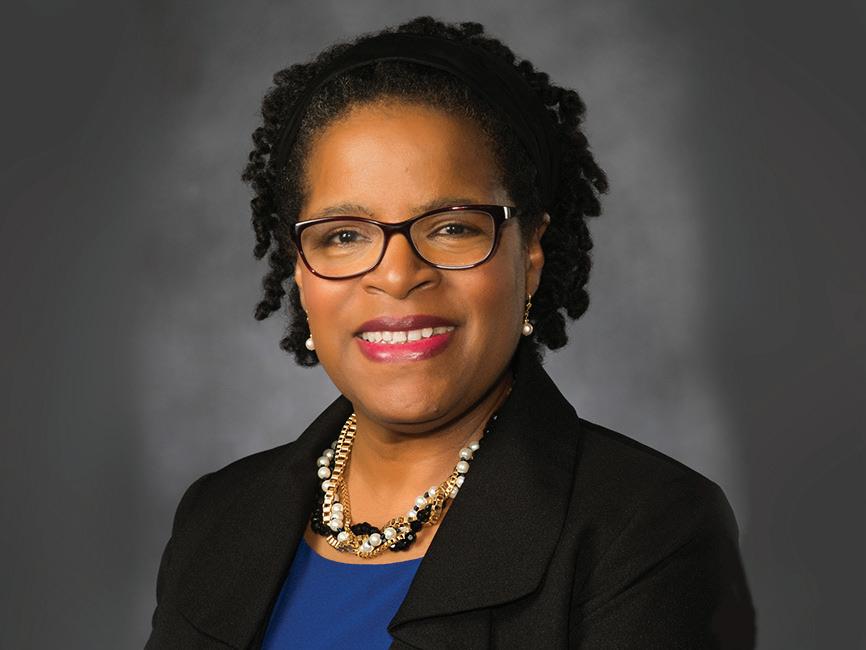
“Dr. Bassard’s leadership experience and accomplishments show her passion for the power of a holistic education that centers every student,” says Hass. “This serves Rhodes well as she enhances the teacher-scholar model that lies at the heart of the college.”
Bassard previously served as interim senior associate dean for faculty affairs in the College of Humanities and Sciences at Virginia Commonwealth University, following two years as senior vice provost for faculty affairs.
“I feel a deep alignment between Rhodes College’s mission as a residential liberal arts college serving a talented and diverse student body and my own values as a teacher, scholar, and administrator,” says Bassard. “As a first-generation college student, the liberal arts education I received at Wake Forest University instilled a deep love of learning and of academic rigor which became the foundation for my journey as a teacher, scholar and academic leader. I am excited to find a similar commitment to liberal arts education at Rhodes.”
Her experience has already served the college well as co-chair for the Planning and Priorities Task Force. The task force reviewed the college’s strategic plan in light of recent changes and presented recommendations regarding institutional priorities and budget guidelines to lead the college toward a stronger future. Bassard will continue to implement these recommendations and other priorities in the strategic plan alongside Dr. Sherry Turner, vice president of strategic initiatives, supporting diversity and inclusion efforts, faculty development, leadership, and curriculum development. Bassard also works with Dr. Meghan Harte Weyant, the newly appointed vice president for student life, and the faculty to provide the best possible holistic learning experience for Rhodes students.
In addition to her administrative responsibilities, Bassard serves as professor of English and Africana studies. After earning a B.A. from Wake Forest University, an M.A. from Virginia Commonwealth University, and a doctorate from Rutgers University, Bassard began her academic career at the University of California - Berkeley in 1992 and most recently served as chair and professor of English at VCU.
Throughout her career, Bassard has studied African American literature and culture. Her dissertation focused on early Black women preachers and religious writers, which served as the framework for her first book, Spiritual Interrogations. She has published two additional books: Transforming Scriptures, the first monograph study of Black women writers’ engagements with the Protestant English canon of the Bible, and recently the first edition of the autobiographical writings of Peter Randolph, a Virginia ex-slave.
“Dr. Bassard brings a wealth of experience with her to Rhodes. Her ability to advance and promote the teacher-scholar model, so dear to Rhodes, will strategically position us to produce the next generation of world leaders who are capable of translating their liberal arts education into meaningful service, constructive social advancement, and transformative scientific developments to society,” says Dr. Shana Stoddard, search committee member and assistant professor of chemistry.
Following a national search, Dr. Meghan Harte Weyant joined the college’s senior leadership team as vice president for student life. With an original start date of July 1st, Weyant assumed her role in late spring to provide additional support during the COVID-19 emergency.
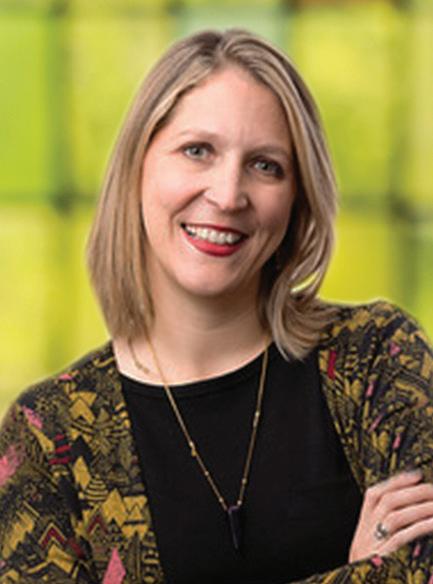
“Dr. Weyant has been instrumental in our success navigating the college through the public health crisis and delivering on the meaningful student experience that is a hallmark of a Rhodes education,” says President Marjorie Hass. Her leadership and innovative approach building systems of support for students has been crucial during this time.
Since her arrival, Weyant has played a key role in the organizing and implementation of the college’s health and safety plan as leader of the Health and Safety Committee. Engaging a guiding coalition of student leaders as well as faculty and staff, Weyant has led the efforts to apply the recommendation of our partner, Baptist Memorial Health Care, and launch a campaign to educate the community around best practices and expectations.
Weyant has also focused the beginning of her tenure at Rhodes on increasing opportunities for student connection and community building, made even more important by the limitations of remote learning. She has worked with staff and students to create virtual activities focused on connection and wellness, launched a weekly student newsletter, Lynx Life, and launched her own Instagram account, @ rhodes_mhw, where she shares important information and updates for current students.
“I’m thrilled to be part of a community that uplifts the critical importance of learning, compassion, and leadership in both our communities and world,” says Weyant. “The opportunity to work with our outstanding students, faculty, and staff to bring to bring to life our health and safety plan and strengthen our sense of community even while separated has been deeply rewarding, and I am grateful to work with the student life team and the Rhodes community.”
“Dr. Weyant illustrates her ability to lead with compassion in everything she does,” says Jacob Fontaine, search committee member and vice president of Rhodes Student Government. “Her unique student-centered approach to innovation in student life seamlessly aligns with both Rhodes’s current and future institutional goals.”
Weyant was previously assistant vice president of student affairs and dean of students at Rollins College in Winter Park, Florida. She received her Ph.D. in sociology from the University of Central Florida, where her dissertation and research focused on the impact of social inequalities on education and achievement.
National Acclaim for Rhodes College
Rhodes Named Best Liberal Arts College, No. 2 Best College Overall in Tennessee by Niche
Rhodes College landed top spots on Niche’s 2021 College Rankings. With overall high grades for academics, professors, diversity, and value, Rhodes ranked No. 1 for Best Liberal Arts Colleges in Tennessee and No. 2 for Best Colleges in Tennessee. It came in No. 1 for Best Colleges in Memphis. Nationally, Rhodes ranked No. 47 among the best liberal arts colleges and No. 50 among the best small colleges. Niche also ranked best colleges by major, with Rhodes standing out for business, political science, biology, psychology, education, and history.
Rhodes College Named a Best College by The Princeton Review, Ranks 11th for Community Engagement
Rhodes College ranks 11th for “Students Most Engaged in Community Service” and is recommended as one of the nation's best institutions for undergraduates to earn their college degree in The Princeton Review’s newest edition of The Best 386 Colleges. “We salute Rhodes College for its outstanding academics and we are truly pleased to recommend it to prospective applicants searching for their personal ‘best-fit’ college,” said Robert Franek, The Princeton Review’s editor-in-chief and lead author of The Best 386 Colleges. More than 80 percent of Rhodes students are engaged doing meaningful work in the community. See “Beyond the Gates” on page TK.
Rhodes Among Top Schools in Fiske Guide to Colleges 2021
Rhodes College is featured in the Fiske Guide to Colleges 2021, which includes profiles of more than 300 of the “best and most interesting” colleges in the country. Rhodes also is recognized for strong programs in economics, English, international studies, history, chemistry, business, biology, and psychology. Edited by former New York Times education editor Edward B. Fiske, the annual Fiske Guide to Colleges delivers an insider’s look at what it’s really like to be a student at schools in the United States, Canada, Great Britain, and Ireland.

Kenan Padgett
From Trivia to Traditions, New Podcast Explores the Little-Known Stories of the College
“Have you ever wondered who your dorm was named for? Why there’s a water fountain dedicated to a dog named Cujo? We are here to help,” says Kenan Padgett, interlibrary loan/information services librarian, in the introduction of “Lynx to the Past.”
The new podcast, produced by Rhodes College’s Information Services staff, uses the college’s digital and physical archives to tell stories about the campus’ history, mysteries, and legends.
Padgett and archivist Bill Short ’71, circulation supervisor Caitlin Gewin ’16, and history student Lillian Brimberry ’21 have rummaged through old documents and images to present a carefully researched and fun podcast.
“One day during winter break, I was listening to a podcast made by the State Archives of North Carolina and thought, Wow! We have so many stories to tell about Rhodes. We have to do this!” says Padgett. She consulted with instructional technologist Corey Phillips on how to get started and also enlisted the help of Gewin. “Caitlin is always up for a challenge. She taught herself how to use the Audacity audio software and has edited all the podcast’s scripts and audio recordings.”
The first two episodes of Lynx to the Past focus on the origins of the Whiteball competition, the Rhodes Seal embedded in the floor of Southwestern Hall, and the bronze lynx statue in front of the Rhodes Tower.
“Before looking into the history of the seal, I had never looked closely at its design and never knew the story behind it. All I knew was to never cross the seal, or else I would not
graduate,” says Brimberry, referring to the traditional Rhodes legend about the seal. “Now, I will be able to fully appreciate the seal and what it represents.”
The theme music for the podcast is an arrangement based on the “Lynx March.”
“Here’s a fun fact,” says Padgett. “‘The Lynx March’ is often attributed to Professor Charles Mosby ’51, but according to a document we discovered in the archives, it was actually composed by Jimmy Cobb ’50 in Mosby’s dorm room!”
Brimberry, who is a Rhodes student associate in the interlibrary loan office and whose concentration is public history, received academic credit for working on the podcast all summer. “I spent most of my days researching, writing, and recording for it, and each day I learned something
new about the history of Rhodes,” she says. “I have thoroughly enjoyed this unique approach of looking at history. It has not only benefited my academic career, but also my personal development. I am grateful for Kenan and Caitlin for giving me this opportunity and helping me along the way.”
Padgett says her hope for the podcast is that it inspires listeners to look around campus and see all the little details that make Rhodes so special.
“I have researched almost every house I have every lived in and traced the stories of the people who have lived there,” she says. “Rhodes has been my second home for almost 20 years, and I am becoming just as obsessed with its history. I think we are all a little homesick for campus right now, and this makes it feel a little bit closer.”
Those who would like to share their stories for future episodes of “Lynx to the Past” can email lynxtothepast@rhodes.edu.
Rhodes Unveils New Look for Lynx Athletics
The Rhodes College Lynx have a new look. The college has unveiled a reimagined set of logos representing the Lynx athletic brand. The primary logo shows the Lynx with the iconic “M Bridge” to illustrate the key partnerships and deep relationship between Rhodes and its home city.
“I can’t wait to see our student athletes in action with their new uniforms,” says Matt Dean, director of athletics. “I’ve been at Rhodes for 30 years; this is a pivotal moment for the Lynx. Our commitment to the new brand shows the importance of intercollegiate athletics here at Rhodes.
The new athletics brand guide is the result of a year-long project. Student athletes and coaches participated in on-campus focus groups. It was in these groups that student athletes shared the idea to include a nod to Memphis in the logo. In a national survey of prospective college students, the final designs received high marks.
“Our strategic plan calls for increased visibility and support for our Division III athletics program,” says President Marjorie Hass.
“Our research showed that a more distinctive Lynx brand would better represent the strength and spirit of our athletic program. We have 23 NCAA sponsored sports, but we compete as one Rhodes.
The college’s new athletic brand guide gives our coaches a variety of uniform and apparel options to use for their teams. In addition to the main Lynx logo, there is a new version of the Lynx Head as well as a secondary logo — a shield bearing the distinctive Rhodes R.
The new designs will be phased into use over time. The new logo has been painted on the court in Mallory Gym, since the floor was due to be refinished this summer. However, the turf on Crain Field and other locations won’t be updated until they are due for upgrades. Team uniforms will be updated on their current schedule, but all practice gear will carry the new brand.
The Rhodes College Bookstore has updated its website (rhodeslynxgear/merchorders) with new apparel options.
Rhodes College has joined the Liberal Arts Colleges Racial Equity Leadership Alliance, a group of 51 national liberal arts colleges committed to addressing systemic racism and the unique challenges pertaining to racial diversity, equity and inclusion on campus. Alliance membership provides a range of resources that will assist the college in achieving its strategic goals of fostering a culture of belonging and ensuring a transformational student experience.
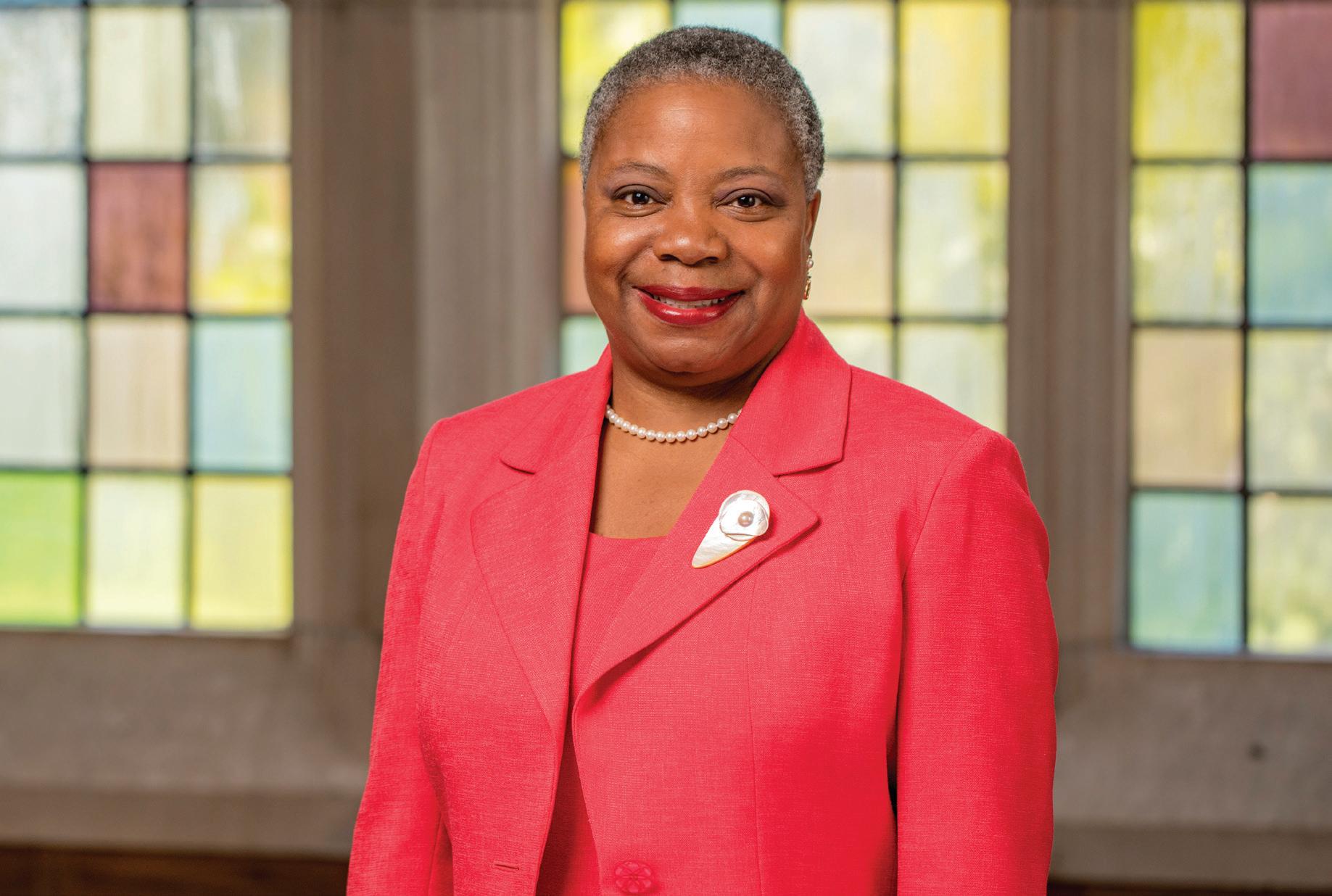
Dr. Sherry Turner '84
The Alliance is organized by the University of Southern California Race and Equity Center. Beginning in January 2021, the center will host a dozen virtual convenings on different aspects of racial equity. Rhodes faculty and staff members will have the opportunity to participate in the events. Members of the president’s senior leadership team and cabinet will be among the first to join the convenings.
The learning sessions, each on a different topic, will be delivered by highly respected leaders of national higher education associations, scholars with expertise in race relations, chief diversity officers, other experienced administrators, and specialists from the center. Participants will have an opportunity to learn from equity dilemmas and racial crises that have occurred at other liberal arts colleges to gain equity leadership tools.
Dr. Sherry Turner ’84, vice president of strategic initiatives and chief diversity officer, will be the college’s primary liaison with the Alliance.
“Rhodes has been taking important steps in promoting a more just, inclusive, and equitable campus community,” says Turner. “One of the most frequent recommendations we receive is for capacity building among faculty,
staff, and administrators. Our participation in the Alliance will provide tools and resources for our leaders to deepen their understanding of racial dynamics and to be catalysts for transformation. Our participation will also inform how we engage the difficult but critical questions of race, how we understand our campus climate, and how we use institutional data to measure our progress and hold ourselves accountable.”
As a member of the Alliance, Rhodes will also have access to an online repository of resources and tools, including those that facilitate recruiting racially and ethnically diverse talent.
“We could not ask for a better partner to help us expand the program to more cities,” says Deborah Bial, Posse president and founder. “Creating opportunities for students from all backgrounds to excel is critical. We share Rhode’s commitment to diversity and look forward to working with President Hass and her team to ensure the program’s success.”
“This new partnership will help us achieve our strategic goal of building a more inclusive and principled campus community,” says President Marjorie Hass. “I am grateful for Dr. Turner’s leadership and support as we build our institutional capacity to make meaningful change.”
President Hass will meet quarterly with the presidents from the other 50 Alliance member colleges to share strategies, seek advice, and identify ways to leverage the Alliance for collective impact on racial equity in higher education.
Rhodes College announces first-of-its kind partnership with the Posse Foundation
Rhodes College has formed a new partnership with The Posse Foundation to offer full-tuition leadership scholarships to diverse cohorts of students from Memphis and cities around the United States. Many of the cohort members will be the first in their families to attend college and typically attend high schools that are often overlooked in tradition student recruitment.
The partnership with Rhodes will be the first time The Posse Foundation has recruited a cohort composed of students from multiple cities. Remote learning prompted by the COVID-19 pandemic has paved the way for this innovative partnership. Up to two members of each Rhodes cohort could hail from Memphis.
“We are very excited to partner with The Posse Foundation to recruit these cohorts of talented and motivated students to Rhodes,” says President Marjorie Hass. “Posse’s team-based model equips students with the skills to thrive in the classroom and lead on campus. This is an important step in achieving our strategic goals and supporting inclusive excellence.”
The Posse Foundation identifies, recruits, and trains high school students with extraordinary leadership potential. The Posse Scholars will receive full-tuition scholarships from Rhodes. Prospective students may be nominated for the Posse opportunity by public high schools and community centers, and other organizations that serve high school students.
J. Carey Thompson, vice president for enrollment and communications and dean of admission, is thrilled with the new partnership. “The Posse Foundation will help us identify outstanding young people who will be excellent leaders and strong students who we might not otherwise find on our own,” says Thompson. “Posse helps ensure student success with a 32-week pre-collegiate orientation that prepares students to take advantage of the opportunities that a residential college provide. The Posse cohort also trains with a Rhodes faculty mentor who works with each student over the course of their first two years.”
Rhodes will award full-tuition scholarships to 10 students each year of the partnership. The Posse Foundation will identify a field of 20 highly qualified students from around the United States for the Rhodes Admission Office to consider. Rhodes joins more than 60 Posse partner colleges and universities the United States. The foundation has deep roots in Tennessee; Vanderbilt University was the first school to partner with Posse. Since it was founded in 1989, approximately 10,000 students have been awarded more than $1.5 billion in Posse Scholarships. Participating students graduate at rates above 90 percent.
New Supercomputing Center
Thanks to a two-year National Science Foundation (NSF) grant of $389,662, Rhodes will soon have a new supercomputing center.
Dr. Brian Larkins José Rodrigues
Dr. D. Brian Larkins, associate professor of computer science, is principal investigator, and José Rodriguez, chief information officer, is co-principal investigator for the project, which is titled “CC* Compute: A High-Performance Computing Cluster To Accelerate Research, Education, And Training At Rhodes College.”
The competitive award will be used to build a supercomputing cluster — inter-connected computers and servers — that will serve as the cornerstone of a campus-wide research computing center. The new computing resource will greatly advance opportunities for students to engage in computation-based scientific research alongside faculty in a wide range of disciplines, including computer science, biology, mathematics, chemistry, and economics.
“A computing resource of this scale is rare among liberal arts institutions,” explains Larkins. “This will allow faculty and students to conduct research at a dramatically larger scale. Instead of running a single experiment for hours on a desktop computer, for example, researchers will now be able to run thousands of experiments concurrently.”
Larkins and Rodriguez have been working with academic affairs and physical plant staff to build out a dedicated space for the system in Briggs Hall. “We aim to have the system procured and installed by the end of the year,” says Larkins. “This will be one large computing rack with about 50 server machines con-
Motor and Perception Research
A second National Science Foundation grant of $269,970 to Rhodes College will allow researchers to study brain activity involved in body movement using 3D technology.
Dr. Betsy Sanders Dr. Dan Blustein Dr. Katherine White
The NSF Major Research Instrumentation Award will allow Rhodes to acquire a state-of-the-art motion capture system that will be used collaboratively across programs and departments such as psychology, neuroscience, computer science, and others.
Dr. Dan Blustein, assistant professor of psychology, is principal investigator, Dr. Betsy Sanders, associate professor of computer science, and Dr. Katherine White, professor of psychology, are co-principal investigators for the project, which is titled “MRI: Acquisition of a Movement Tracking System to Explore Embodiment and Cognition.”
“This equipment is going to put Rhodes College on the map as a serious contributor in the movement science research space,” says Blustein. “We are really excited about the diversity of projects we have planned, and about getting students from all over the college involved.”
Motion capture technology can record the movements of dancers and athletes wearing trackers and provide data to improve performance or even prevent injuries. In entertainment, the technology has been used to create characters in animation and gaming programs. Neuroscientists use it to study how brain activity drives the movement of joints and muscles.
Blustein studies how people learn, plan, and control movements, with a focus on what happens to the nervous system following disruptions such as limb amputation or stroke. His research drives the development of new robot technologies, neurorehabilitation techniques, and advanced prosthetic systems.
nected together with a specialized network.”
Rhodes is a research-intensive liberal arts college, and the supercomputing cluster will also function as a platform for classroom experiences; support class activities in computer science, biology, and mathematics; enable researchers to prepare their experiments to run on national compute resources; and contribute unused computing resources to the Open Science Grid, a national, distributed computing partnership.
“This award from NSF demonstrates that it views research at Rhodes as impactful and on the cutting-edge,” says Larkins. “This system will anchor our new campus-wide research computing center and will provide new research opportunities and experiences for our students that many institutions are not equipped for.”
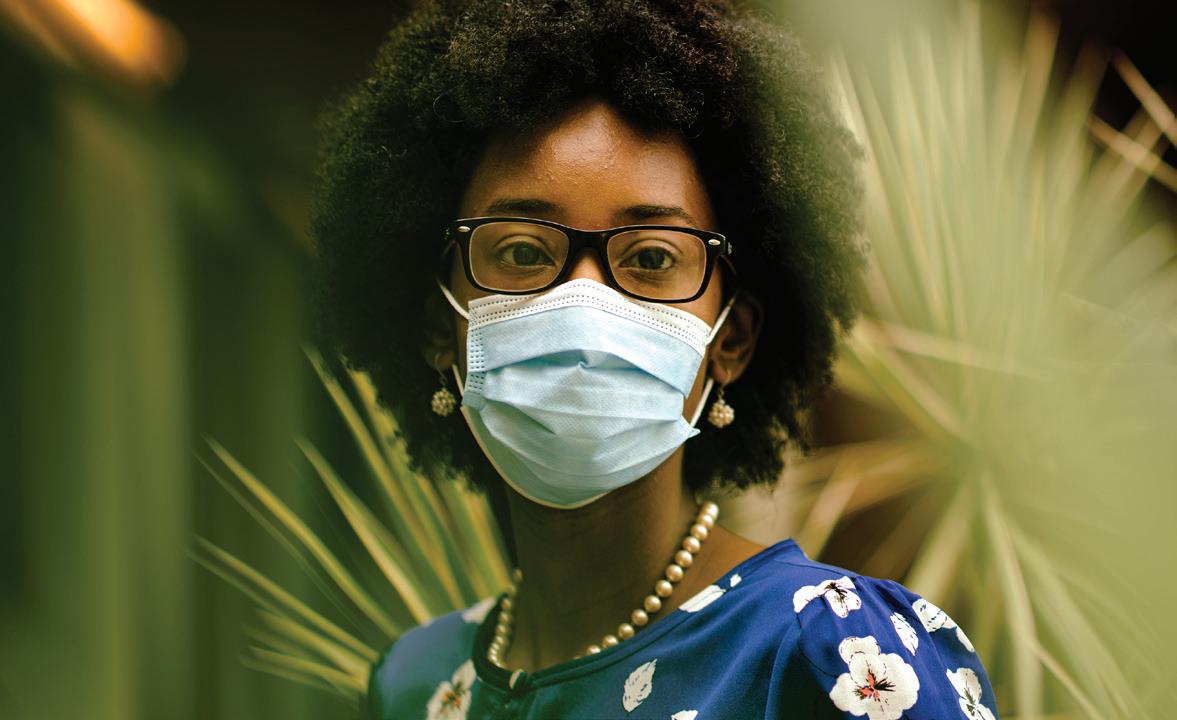
“With the new system, we will be able to precisely track body movements, even finger and facial movement,” he says, “while at the same time measuring brain activity, giving insight into cognitive processes and attentional demands.”
The equipment can support numerous independent student projects and class projects in neuroscience, psychology, and computer science courses. “Students will gain valuable research experience using cutting-edge technology, helping prepare them for graduate school or a variety of careers including in rehabilitation, sports medicine, computer animation, and software development,” says Blustein. “The research proposed in this grant highlights Rhodes as an institution that deeply values how undergraduate research contributes to science.”
Dr. Shana Stoddard and Lab Students Discover Antiviral That Could Aid in COVID-19 Treatment
When Rhodes College switched to remote teaching and learning in March, Dr. Shana Stoddard, assistant professor of chemistry, wanted to continue creating meaningful labs for her first-year Foundations of Chemistry course. Instead of showing videos, she decided to charge her students with designing and testing possible therapies for coronavirus. Many of her lab students enjoyed the lab work so much that they continued as part of Stoddard’s Molecular Immunotherapies Research (MIR) lab.
PHOTOGRAPH BY HOUSTON COFIELD
Stoddard (above) and the lab students found an antiviral compound that may be able to shorten the length of illness for patients with Covid-19. They also discovered how to design the drugs to interact with the coronavirus protein better to facilitate better drug design. The students’ work was published in the journal Viruses on August 26, 2020.
“The research work here is significant because we have defined the structural features that will make a better Covid-19 antiviral drug compound and then used those features to design several novel Covid-19 antiviral compounds which we are now pursuing for testing,” says Stoddard. “The remarkable team of students who really took hold of this opportunity, during the remote phase of the Spring 2020 semester, have really produced seminal contributions to the field of science. This accomplishment demonstrates the ability of Rhodes College to not only push students to creative and academic excellence but to equip them to become the next generation transformational leaders in society.” Many of the 14 student co-authors were first-years at the time of the project.
“The project was a great way to learn how even the simpler concepts that we learn in Foundations of Chemistry can have a real-world impact on the research of tomorrow. This opportunity allowed me to find my true passion for therapeutics and research medicine,” says student researcher Ben Oelkers ’23.
Their story was covered by the Daily Memphian. In addition to Serena Stoddard with the Tuskegee University College of Veterinary Medicine and Felissa “Emma” Wallace from Walnut Hills High School, the Rhodes student co-authors were: Benjamin Oelkers ’23, Kennedi Fitts ’21, Kellen Whalum ’21, Kaylah Whalum ’21, Alexander Hemphil ’23, Jithin Manikonda ’23, Linda Martinez ’23, Elizabeth Riley ’22, Caroline Roof ’21, Nowreen Sarwar ’23, Doni Thomas ’20, and Emily Ulmer ’22.
Rhodes Welcomes New 2020 Faculty
Rhodes College welcomes 10 new faculty to its distinguished roster for the 2020-2021academic year in the areas of anthropology and sociology, biology, history, modern languages and literatures, political science, psychology, and religious studies.
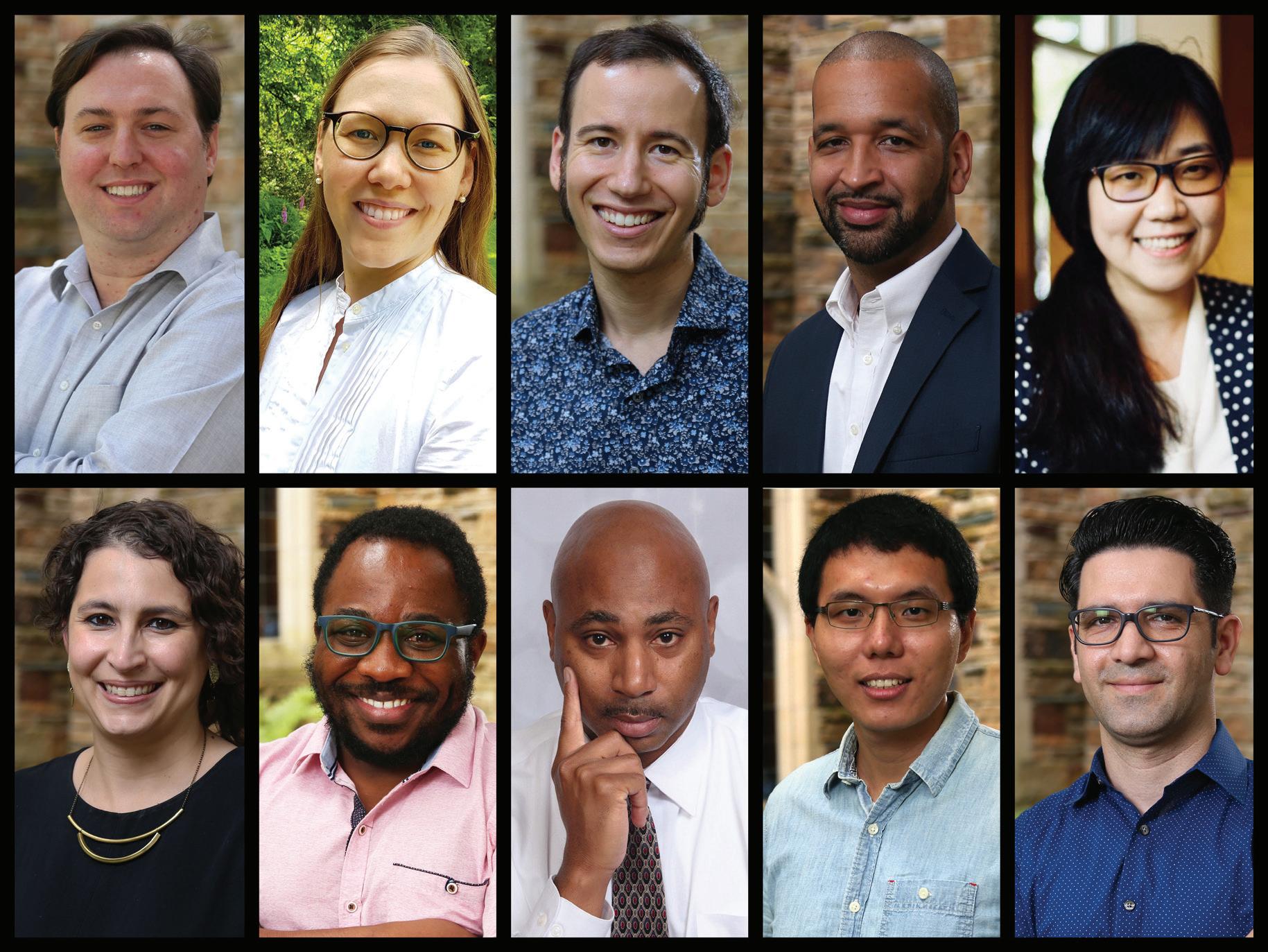
“This outstanding cohort of teachers and scholars will bring a variety of engaging course offerings to our curriculum,” says Dr. Katherine Bassard, provost and vice president for academic affairs. “Excellence in scholarship as well as the mentorship relationship between professors and students is at the heart of a Rhodes education, and I know that those who have joined us share these values.”
Sarah Ifft Decker, History
Dr. Sarah Ifft Decker joins the Department of History as assistant professor. Ifft Decker received a Ph.D. from Yale University in 2017 and taught Jewish History, Women in the Bible, and Medieval and Early Modern Jewish Religious Movements at Indiana University as a postdoctoral fellow and lecturer. She serves on the Program Committee for the 2021 Annual Meeting of the Medieval Academy of America and has presented at conferences across the world.
Joshua A. Goodman, Psychology
Dr. Joshua Goodman joins the Department of Psychology as assistant professor. Goodman received a Ph.D. in 2018 from the University of California and served as a visiting assistant professor of psychology at Bates College. His publications about the struggles of the LGBTQ+ community have been featured across the country, and he has presented his research — from the psychological behaviors of individuals with schizophrenia to recruiting parents of sexual minority youth — in Chicago, Denver, Portland, and Rio de Janeiro.
Hadi Khoshneviss, Anthropology and Sociology
Dr. Hadi Khoshneviss joins the Department of Anthropology and Sociology as assistant professor of sociology. Khoshneviss received a Ph.D. from the University of South Florida in 2019 taught at Kenyon College for one year as a visiting assistant professor. His research areas are whiteness studies, immigration, social movements, and decolonial theories, and his papers and essays have appeared in Ethnicities, Postcolonial Studies, and Mobilities.
Brent Morgan, Psychology
Dr. Brent Morgan joins the Department of Psychology full-time as visiting assistant professor. Morgan received a Ph.D. from the University of Memphis in 2014, serving as an adjunct professor at the University of Memphis since 2015 and Rhodes College since 2019, teaching both graduate and undergraduate level courses. Morgan is a cognitive scientist researching bidirectional adaptability in human-computer interaction, with primary interest in artificial intelligence in education, specifically intelligent tutoring systems (ITS).
Sydney Moyo, Biology
Dr. Sydney Moyo joins the Department of Biology as an assistant professor. Moyo received a Ph.D. from Rhodes University (South Africa) in 2016 and was a postdoctoral researcher at Louisiana State University (LSU) and a postdoctoral fellow at Albany Museum (South Africa). Moyo uses invertebrates, biochemical techniques, and mathematical models to reveal the connections between terrestrial and aquatic ecosystems, and how those connections are shaped by humans.
Justin Rose, Political Science
Dr. Justin Rose was appointed dean for faculty recruitment, retention, and diversity effective in July and also serves as associate professor and chair of the Department of Political Science. Prior to joining Rhodes, he served as an associate professor of political science and co-director of the Africana Studies program at Hobart and William Smith Colleges. Most recently, he was a fellow in the Office of Diversity, Inclusion, and Belonging at the Harvard Kennedy School. As a member ofAcademic Affairs, Rose’s primary responsibility is to help recruit and retain a first-rate and diverse faculty.
Qian Shen, Biology
Dr. Qian Shen joins the Department of Biology as assistant professor. Shen grew up in Zhejiang, China, and received his bachelor’s degree from China Agricultural University. He received a Ph.D. from Ohio State University in 2019 and was an instructor at Ohio Wesleyan University and a postdoctoral researcher at Ohio State University before joining Rhodes. He studies the deadly fungal pathogen Histoplasma that causes life-threatening infections to immunocompromised people and has presented his work at national and international conferences.

Raissa A. von Doetinchem de Rande, Religious Studies
Dr. Raissa A. von Doetinchem de Rande joined the Department of Religious Studies as assistant professor. Von Doetinchem de Rande received a Ph.D. from Princeton University in 2020 and taught at Princeton as an assistant in instruction to classes pertaining to Christian Ethics and the Qur’an. In 2019, she organized a public lecture and graduate seminar, “Sharia at the University,” and her publications have been well-received at conferences across the country.
Earl Wright II, Anthropology & Sociology
Dr. Earl Wright II joins the Department of Anthropology and Sociology as professor of sociology. Wright received a Ph.D. from the University of Nebraska and has served on the faculty at the University of Cincinnati, Texas Southern University (as Chairperson of the Department of Sociology), Fisk University, and the University of Central Florida. His primary research and teaching interests are on the contributions of Blacks to American sociology and the sociology of hip-hop. In 2016, the Southern Sociological Society presented him with the Charles S. Johnson Award for excellence in research on race and the south.
Yinyin Xue, Modern Languages and Literatures
Dr. Yinyin Xue joins the Department of Modern Languages and Literatures as assistant professor of Chinese studies. Xue received a Ph.D. in Chinese Literature and Culture from the University of Wisconsin-Madison in 2019 and was a visiting assistant professor of Chinese at Kenyon College. Her specialization is twentieth-century Chinese literature and media culture. Xue will teach a wide variety of courses in Chinese language, literature, media, and film.
Beyond the Gates A wide-ranging community engagement program is a fundamental part of the Rhodes College experience.
By Michael Finger
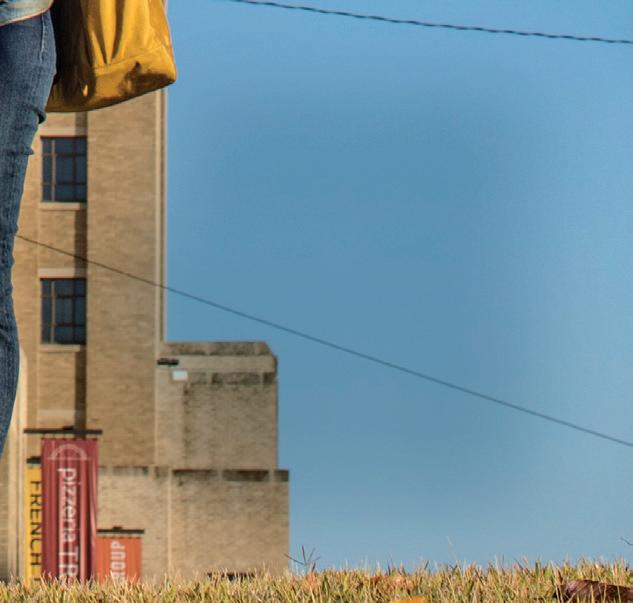
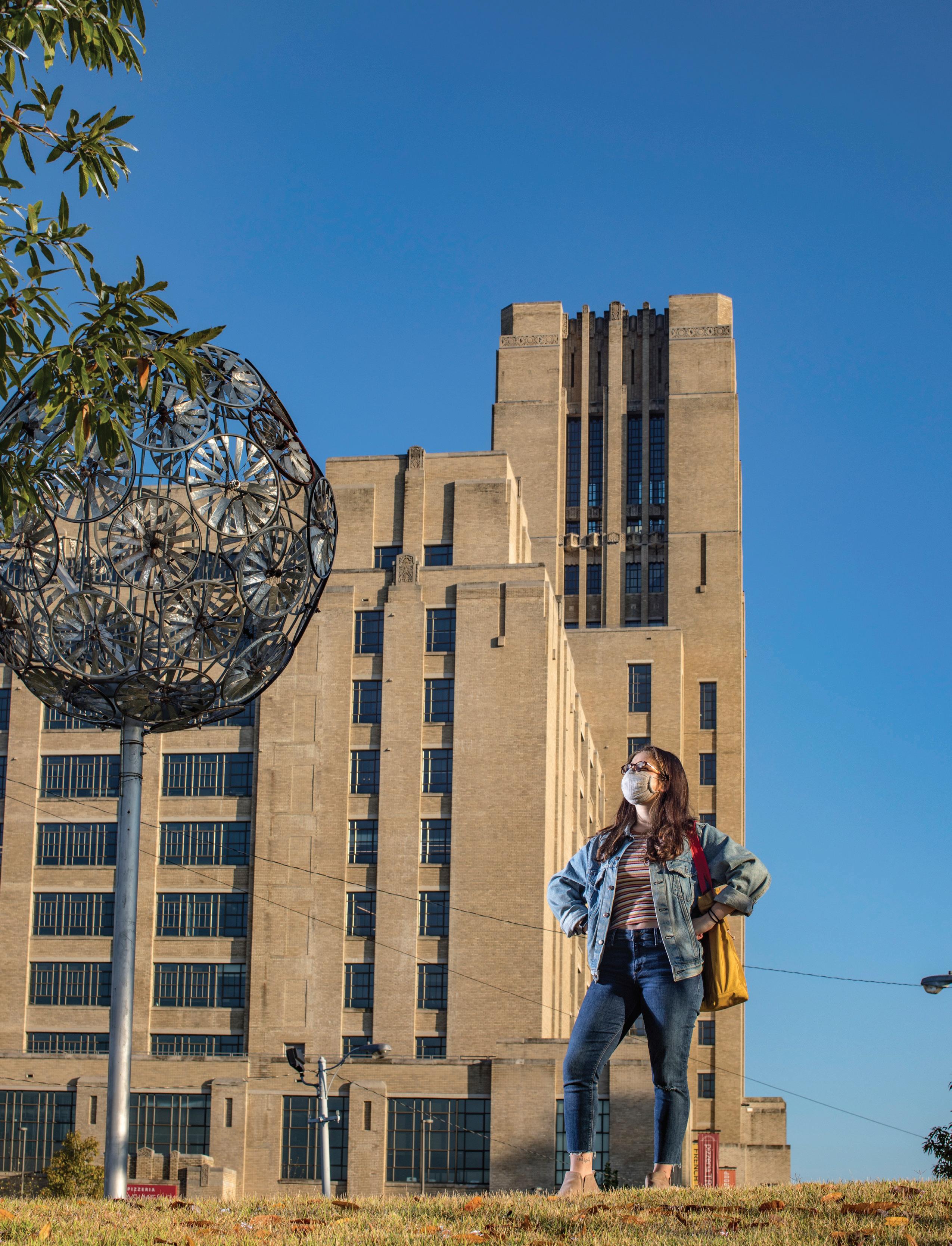
Demi Shamsi-Basha ’22 poses in front of Crosstown Concourse, where she volunteered on the front lines of Church Health’s drive-through Covid-19 testing site during the summer.
At the Memphis Zoo, Gabrielle White ‘23 is studying the elephants for a special research project on their behavior and conservation. Across town, Mildred Vazquez 21 has been interviewing neighbors for a history of the Highland Heights community. And in a former residence near Audubon Park, Dr. John Bass and young musicians are working with blues legend Bobby Rush to record an all-new version of “America the Beautiful.”
The common ingredient of these and hundreds of other projects taking place every semester across Memphis and the Mid-South? The people are students and faculty members of Rhodes College, involved in the school’s wide-ranging community engagement program. Their efforts have been so successful, in fact, that the Princeton Review recently ranked Rhodes 11th in the nation for “Students Most Engaged in Community Service.”
“Providing a transformative liberal arts and sciences education and opportunities for community engagement is at the heart of our college’s mission,” says President Marjorie Hass. “Rhodes’ relationship with Memphis is both a benefit to the students who discover issues and ideas they are passionate about and to the organizations in Memphis in which they invest their time and energy. It is this marriage of the rigorous exploration of academic ideas and hands-on work in the community that empowers our graduates to pursue meaningful change on whatever professional path they choose.”
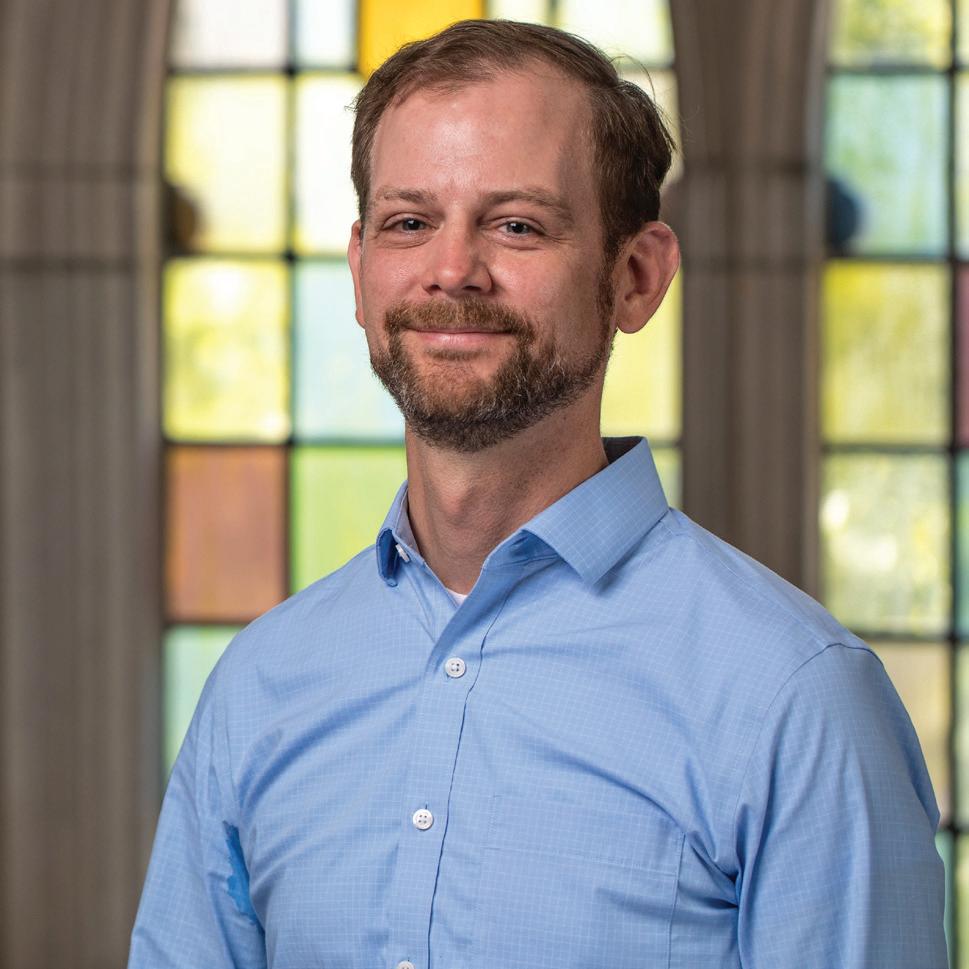
Community engagement at Rhodes takes many forms: academic internships, fellowships, student research, community service, and volunteer work. The college recently formed a committee, co-chaired by Kerri Campbell, director of community relations, and Dr. Natalie Person, dean for curricular development, to oversee the various activities and prepare a report on their progress — especially critical now, as Rhodes and the world at large battle the Covid-19 pandemic.
Campbell learned the value of community service during her days as a student here. “One of my fondest college memories was the time that I spent with a women’s studies course that had a service-learning component,” she says. “I worked in a domestic violence shelter, and I really enjoyed the volunteer work that I did there.”
The Community Engagement Ad Hoc Committee includes seven other members, representing a broad spectrum of the Rhodes community: • Dr. David Sick, professor of Greek and Roman Studies, and director of the Clarence Day Scholars • Dr. Elizabeth Thomas, professor of psychology and chair of Urban Studies • Dr. Darrell Ray, director of special projects • Jessica Kelso, director of health professions advising • Sandi George Tracy P’19, director of career services • Tiffany Ford ‘95, director of the Bonner Center for
Service • Dr. Charles Hughes, associate professor of history, and director of the Lynne and Henry Turley Memphis Center
“We needed to think how we would continue with our level of service and visibility in the Memphis community in a way that was both safe and responsive to the community’s needs,” says Campbell. “We both assessed what we had been doing prior to the pandemic, and what change, if any, was needed. The basic question was: How can we continue delivering this service?”
Some situations rendered that impossible. Rhodes students who had internships and fellowships in hospitals and other medical settings were, in many cases, unable to continue them — at least for the foreseeable future. The risk from Covid-19 was too great, and the facilities themselves often needed to devote all their attention and resources to fighting the pandemic.
The popular St. Jude Summer Plus Fellowship program was halted, because the work required students to be in laboratory settings on the hospital campus — something deemed too risky. That program normally accommodates some 25 students, but for the moment, St. Jude can’t determine when it will resume.
Another setback was Rhodes’ involvement with the Wellness and Stress Clinic of Memphis. Before the work there was suspended because of the increasing risk of Covid19, however, City Grant Fellows and other volunteers helped staff the clinic’s tele-health services, organized and staffed a Covid-19 testing site, and provided follow-up information on the test results.
“In each of these areas, Rhodes students were critical in both the planning and implementation,” says Dr. Peter Hossler, assistant professor of urban studies. “Emma Taylor ’20 deserves special recognition because she took over as the
Dr. John Bass
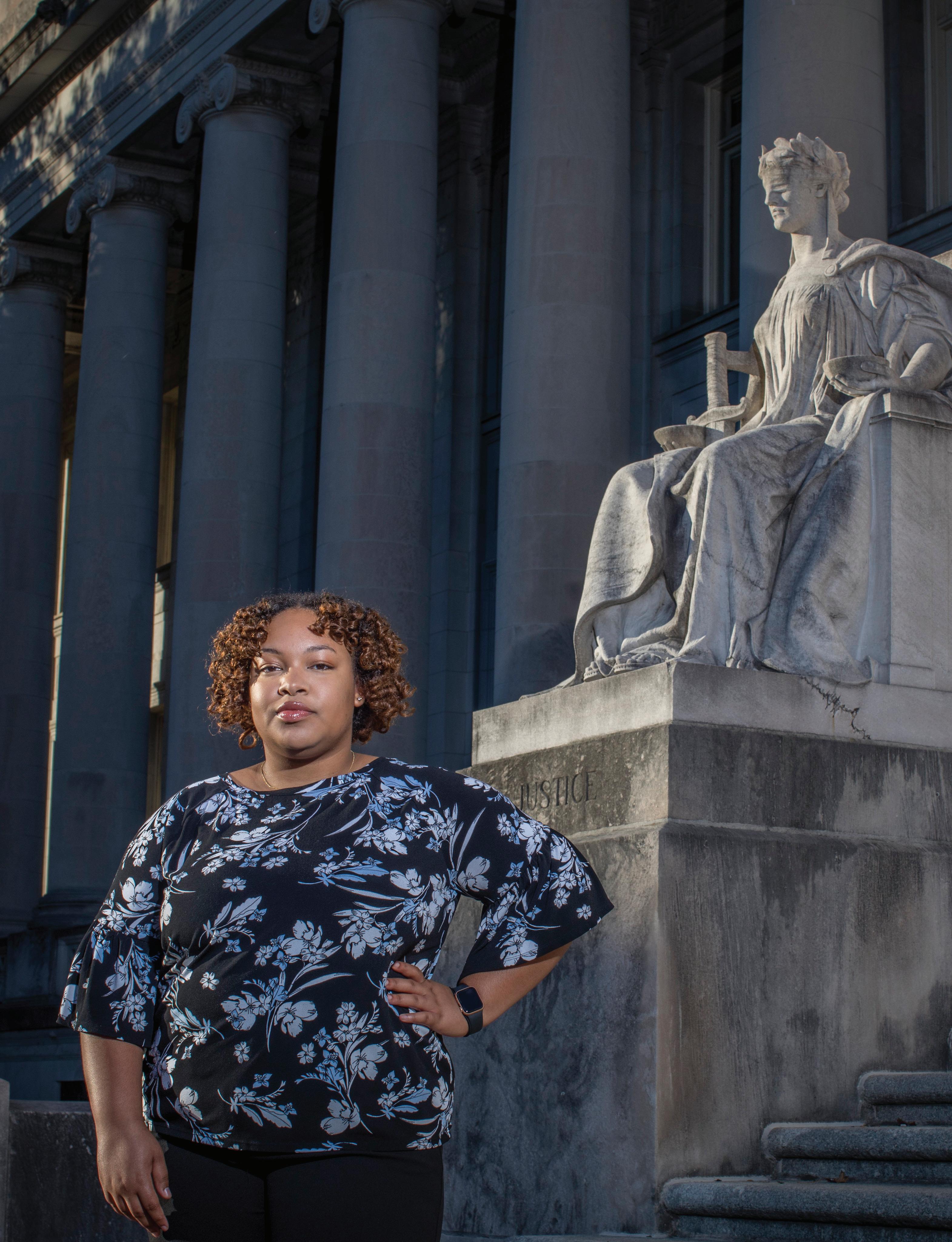
Sydney Jones ’21 stands outside the D’Army Bailey Courthouse near the statue representing Justice. Jones worked for Memphis Area Legal Services’ Restoration of Rights program as part of Rhodes’ summer service fellowship.
de facto clinical director for two weeks when I had to leave the country due to a death in the family, and other students took on important leadership roles.”
Also affected have been the community service projects conducted by the Clarence Day Scholars, which the program stipulates “must be completed in Memphis.” Dr. David Sick, program director, helped juniors and seniors devise assignments that could be conducted remotely, but for the time being, first- and second-year students have been asked to delay their Day projectuntil the Covid-19 situation has improved.
In many situations, however, the engagement continued, as the students and their community partners adapted. “I’d say our involvement with academic internship and fellowships is down by about one-third, but in many situations we were able to continue,” says Campbell, thanks to Zoom and other new technology. “If we have a student who wants a ‘beyond the gates’ service activity, we will usually find ways to make that happen, even if it’s getting them plugged into a virtual opportunity.”
For example, the Rhodes Institute for Regional Studies, an eight-week summer program, accepted 22 students for a variety of research and creative projects — described in the Community Engagement Report as “an intimate intellectual odyssey” — by allowing them to conduct their work virtually. Those projects included the history of the Highland Heights community mentioned earlier, while also covering such topics as “The Vollentine-Evergreen Greenline: Dividing or Connecting Communities,” “Reversing the Possessive Investment in Whiteness: Memphis Activists and Organizers on Entering the Racial Justice Movement,” “Historical Analysis of The Farm Intentional Community,” and others.
According to Dr. Elizabeth Thomas, students in the Applied Neighborhood Equity class have continued their work in Memphis’ historic Orange Mound community. “They started by learning the history of the neighborhood from residents who guest-lectured in the class,” says Thomas, “and working with Britney Thornton, executive director of JUICE Orange Mound, to develop a revitalization plan. The project means gathering neighborhood data, community insight, and learning the national best practices for equitable neighborhood revitalization.”
Other students are involved with Thomas’ Community Psychology course and working with the BRIDGES Change organization. The goal is to “create more supportive and inclusive classrooms and end the school-to-prison pipeline,” says Thomas, noting “they are also investigating how to best allocate mental-health funding with the Memphis community.”
The Mike Curb Institute, where Dr. John Bass is producing a new version of “America the Beautiful,” has adapted to the “new normal.” Named a “Top Music Business School” by Billboard, the Institute has continued its work in the community with a new record label, podcasts, a zine, and a growing social media platform. A new online series called the “Curb Quarantine” enables some 20 students each semester “to engage in community-facing creative endeavors by streaming their creations.”
Many academic courses with an element of community engagement have continued despite the pandemic. Student teaching at local schools, for example, has continued, by working with teachers to provide online instruction. Three biology students — Gabrielle White ‘23, Khanh Ton ‘23, and Meredith Hatfield ‘23 — are still engaged in their long-time study of elephants since the work can be done while maintaining social distancing from the general public.
This fall, other Rhodes College fellowships were completed off-site, thanks to remote learning capabilities, including research in the fields of chemistry, physics, religious studies, anthropology, history, and political science.
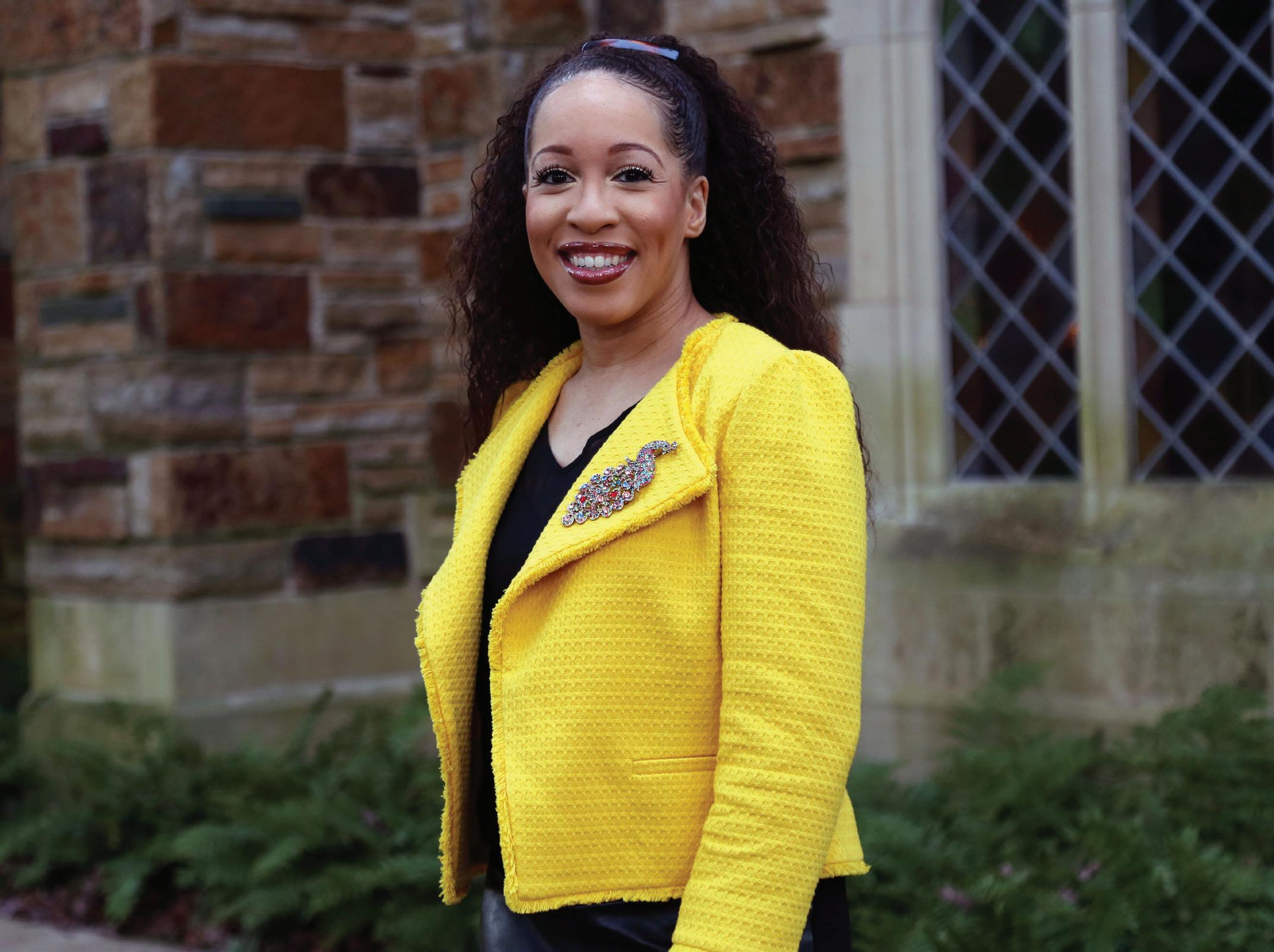
Kerri Campbell, Director of Community Relations
For many Memphians, the academic internship program may be the most visible example of community engagement activities at Rhodes College. Each year, during the spring and fall semesters, some 150 students participate in an academic internship with more than 100 organizations in the Memphis area, including hospitals, law firms, businesses, government and non-profit agencies, and museums.
In return for course credit, they get an inside look at the career they are considering, gain valuable experience, and develop networking opportunities that will be invaluable when they enter the job market.
“Academic internships are woven into the fabric of the curriculum at Rhodes College,” says Sandi George Tracy, director of career services. “Through the academic internship program, students are able to see how academic principles are realized in an applied environment.”
As a career services handout explains: “Through the Rhodes Internship Program, the world becomes your classroom. Theories and formulas take on new meaning as they are applied in business, government, and nonprofit environments.” By the time they graduate, some 70 percent of Rhodes students have taken part in some form of internship within the community.
This year, however, has presented special challenges. Tracy explains that the internship program is down about 40 percent because of Covid-19. Some business partners have reduced their staff or, with their employees working from home, didn’t feel they could offer a meaningful in-person experience for the students.
“Internships look a lot different this fall, but there have also been some positive outcomes,” says Tracy. “For example, we are examining and re-imagining the possibilities of virtual internships in the future. Prior to the pandemic, the mainstream thought was that students should be physically at the internship site. This new way of working has given us pause and helped us to think about leveraging new opportunities for students outside of Memphis.”
“Our favorite new word that we have been using is ‘nimble’ and that can be a benefit of acollege like Rhodes,” says Campbell. “You can pull together a small group of decision-makers and adapt very quickly.”
A good example of that is the Rhodes Response series, presented virtually. “Covid-19 really hit Memphis hard in mid-March, and by May we had started our first series on the pandemic,” says Campbell. These online seminars have addressed key issues affecting America, with topics devoted to “The Science of Covid-19,” “Black Communities and Law Enforcement,” and “Looking to the Past: How Did We Get Here?” with many others scheduled for 2021 and beyond.
“When we talk about community engagement, of course, we are usually talking about our students,” says Campbell, “but these events allowed us to share our intellectual resources — of both students and faculty — in a quick and responsive way. We didn’t have to scramble to put anything together; we had within our own community the people who could lend their expertise to these topics.”
Emerging technology also allows Rhodes to reach far beyond the traditional limits of community involvement. “With such events as our Constitution Day lectures, Alumni and Friends Book Club, Visiting Writers Series, and others, we can now reach a global and more diverse audience,” says Campbell. In the past, it was mainly Memphians who gathered on the Rhodes campus to attend these events. Now, they are available to a national audience.
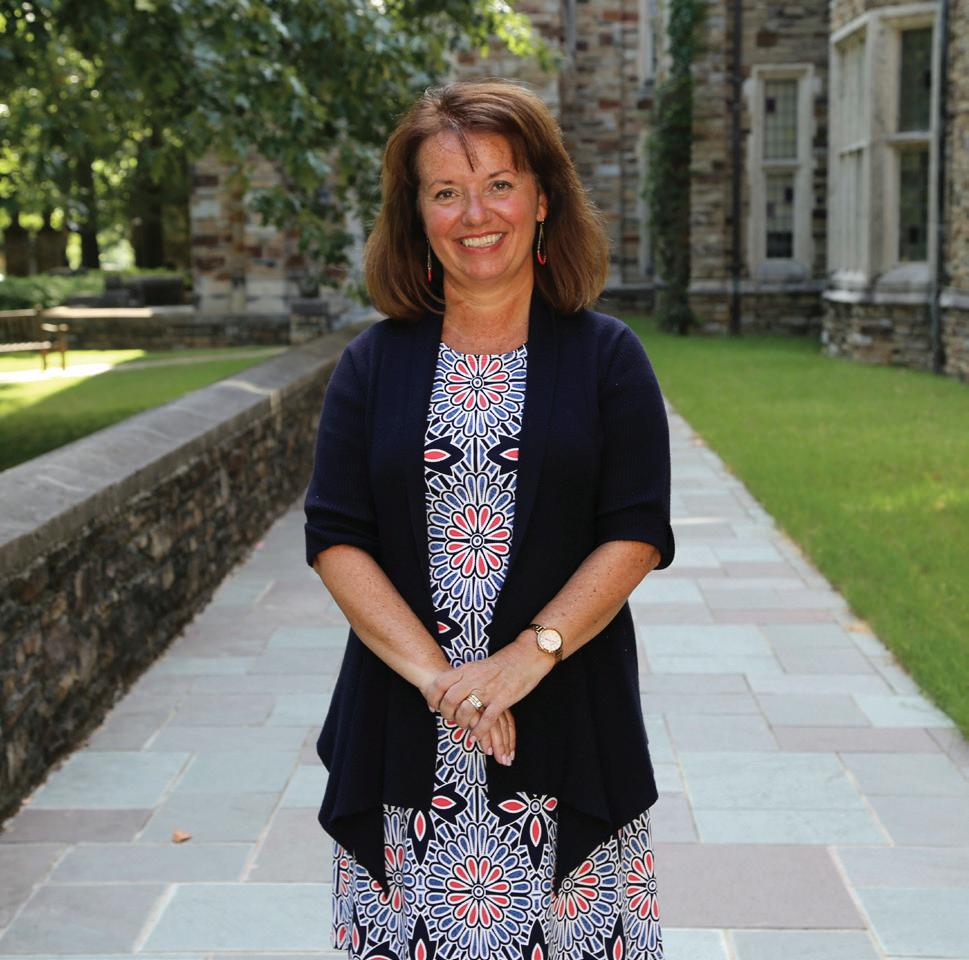
Despite the Covid-19 pandemic, the report from the Community Engagement Committee emphasizes that “Rhodes will offer and support meaningful community engagement opportunities for students, while providing impactful service to our community partners during a pandemic.”
What’s more, the college “will maximize our location in Memphis as a strategic advantage for Rhodes and an important contributor to the Rhodes Edge, and build and maintain relationships that expand our mission cooperative with interested nonprofits, schools, community partners, businesses, and local government.”
Campbell sums it up this way: “We will look at what we’re doing, how we are doing it, how we can do better, and how we can continue to provide our students with a world-class education that has community service at its core.”
Sandi George Tracy P’19, Director of Career Services



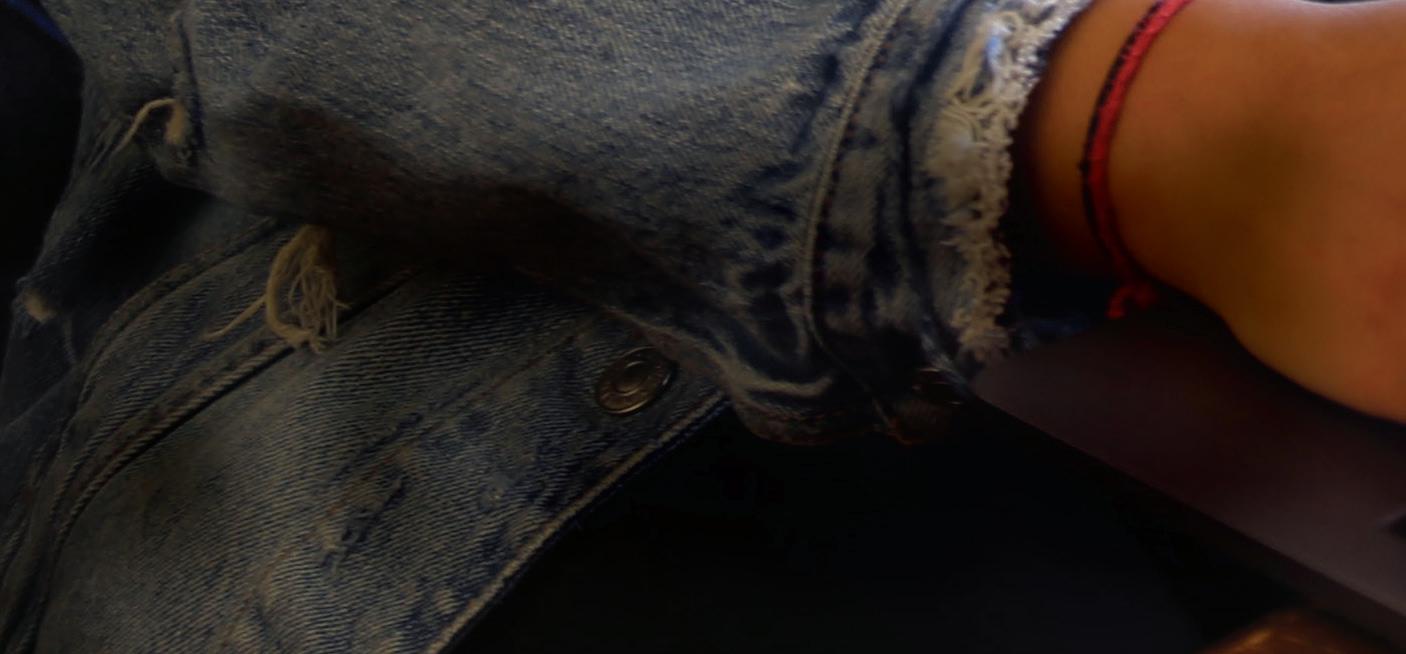

Charting a Course a Course
Navigating a pandemic is just one challenge that higher education institutions face.

Students living in Memphis were able to study in the library and use the athletic facilities as part of a Covid-19 fall facilities pilot program.
By Samuel X. Cicci ’15
Photography by Ethan Van Drimmelen
Drive down University early next year, and the gates leading into Rhodes College will be open, welcoming back a number of enrollees for the spring semester. The familiar sight of students milling about is a testament to the enormous effort the college has put into navigating 2020, with the administration having to juggle plans for both the present day and the long-term. It’s a gross understatement that the COVID-19 pandemic has made operations increasingly difficult for both public and private universities across the country, but dealing with that fallout is just one of many challenges an institution like Rhodes faces. With the country in turmoil due to the coronavirus, are colleges and universities braced to weather the storm? That was the big question posed by Dr. Scott Galloway, a marketing professor at the New York University Stern School of Business. This summer, Galloway put together a data worksheet to gauge the vulnerability of 441 universities included in the U.S. News and World Report’s Top National College Rankings. While the study has not been peer-reviewed and isn’t perfect, Galloway’s spreadsheet aggregates numerous factors to gauge a college’s outlook defined through four categories: Thrive, Survive, Struggle, and Perish. The biggest variables that Galloway takes into account are value and vulnerability to COVID-19. Each college’s value is determined by credential (undergrad admission rate, the number of times a college is searched for online, and the institution’s ranking), experience (millions of student responses gathered from Niche.com), and education (a return on investment, and the money that colleges spend on teaching per full-time student). Vulnerability to COVID-19, meanwhile, is gauged through a school’s endowment and number of national and international applicants. But according to Galloway’s model, Rhodes College is well-poised for the hurdles tossed up by 2020. A high-quality value, coupled with an excellent endowment and other positive factors, earns the school a “Thrive” rating. Due to the challenges of running a higher education institution, the study unfortunately makes for grim reading for some other colleges and universities, estimating that 10 to 20 percent of schools could permanently shut down within the year if students were unable to attend in person. “College is an expensive operation with a relatively inflexible cost structure,” Galloway wrote in his “U.S.S. University” blog post after publishing his data. “The bulk of colleges have become tuition-dependent. If students don’t return in the fall, many colleges will have to take drastic action that could have serious long-term impacts on their ability to fulfill their missions.”
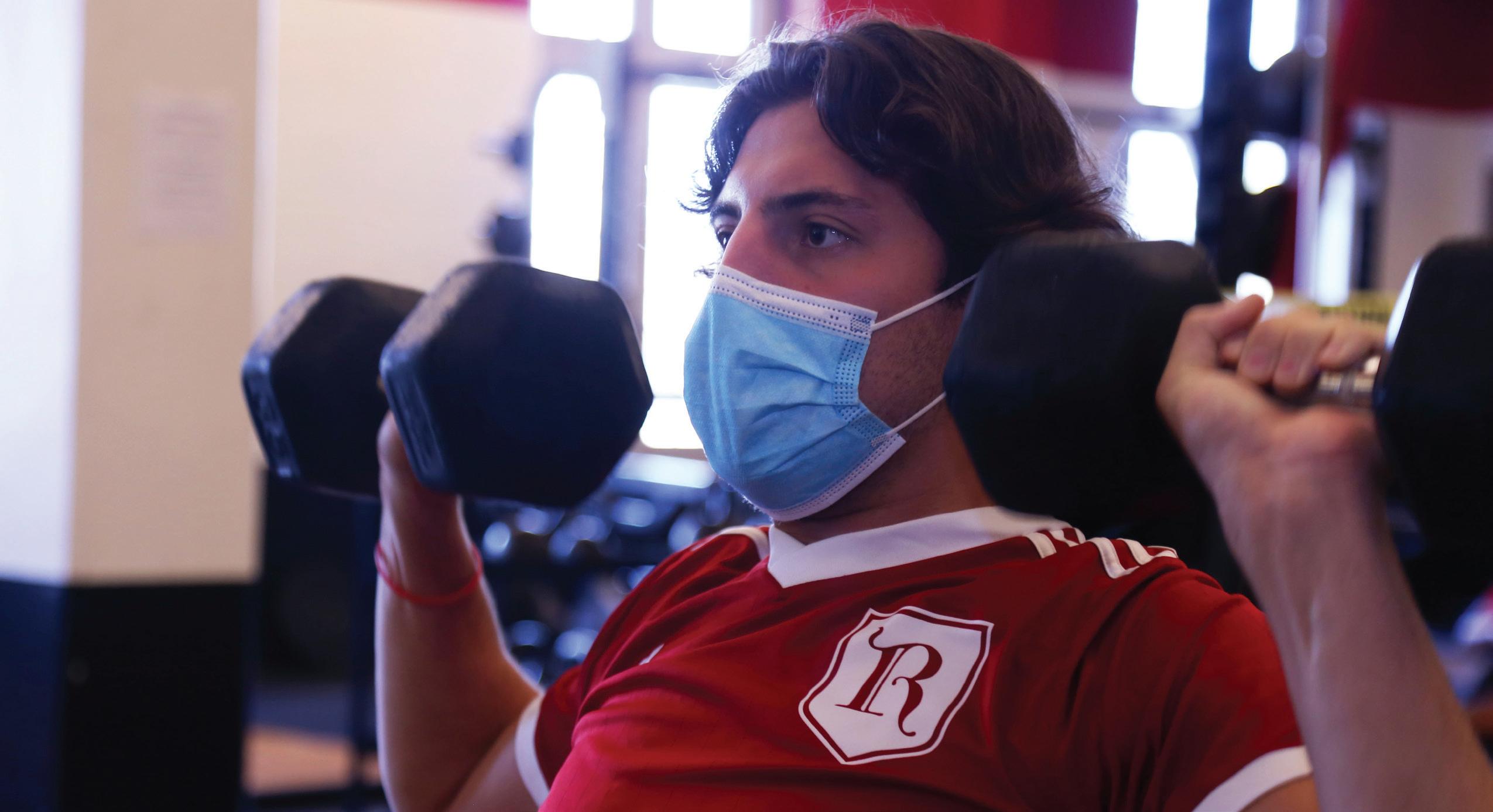
Jack Lippe '22
After all, the cost of running a school continues to grow, and that means a need to increase tuition. The College Board’s “Trends in College 2019” report details an increase of 3 to 5 percent every year over the last few decades. And with costs rising ever higher, schools without a recognizable name or identity may struggle to attract students back at such high tuition costs. Galloway has such institutions marked for Struggle or Perish.
Rhodes, however, has found itself in a better position than most, having for years carefully managed its finances and always looking one step ahead. But while Rhodes remained in relatively good financial health compared to its peers, securing the college’s future financially was still of major importance. President Marjorie Hass formed a Planning and Priorities Task Force to assess the impact the pandemic would have. “We started this process in March, and had several values set before us: health and safety, excellence in education, and support for our faculty and staff,” says Hass. “We had to use this as an opportunity to strengthen the college in the short-term and long-term.”
What we’re now in the midst of doing,” she continues, “is asking whether every dollar we spend is being put to its highest and best purpose? We’re in the middle of that campus-wide process now. And I do think it will mean that there are some wonderful things we’ve done in the past that, we have to say, they’re no longer financially sustainable. And there’ll be other things that we haven’t done that, over the next few years, it will be time to invest in, and we’re prepared to do all of those things.”
The college’s financial health owes itself to the institution’s continued pursuit of high standards and excellence. Rhodes has no plan to compromise on the very metrics that caught Galloway’s eye as a thriving institute.
“What I want to reflect back to our community is that we have to focus on excellence,” says Hass. “And even if that means we face some challenges, we’re not going to waver from our sense of the importance of bringing in students who are prepared to do Rhodeslevel work, and offering a top-notch, liberal arts education.”
But first, Rhodes had to recalibrate. “We knew that we would have reduced revenue this year,” says Hass. “We managed to do some temporary one-year cuts to programs and projects. Some of them are very natural, such as cutting travel. Others are projects that we could defer for a year or two.” Faculty and staff have taken a temporary reduction in benefits, while the senior team, including Hass, took modest salary cuts.
With Rhodes looking at a loss of almost $20 million this year, the college had to get creative to help bridge that gap. The fundraising team asked donors to consider leadership gifts and three-year Annual Fund commitments to help maintain long-term stability.

Bobby Parson, Manager - Special Services
Over the summer, the school also conducted a feasibility study and developed ways to recognize those who committed large outright gifts to fill the gap. Some include naming spaces on campus or matching the donation with unrestricted endowment dollars. In essence, they were looking for something that would permanently recognize those who were able to contribute during a difficult time. So far, Rhodes has raised $5 million towards a $20 million goal, with 99 percent of those contributions coming from alumni.
Beyond the financial health, many factors contribute to Rhodes’ success despite the pandemic. “I think the fact that Rhodes is in a major city is a huge advantage,” says Carey Thompson, vice president of enrollment and communications, and dean of admission. “The opportunities that students see in cities are compelling in terms of leadership, service, and opportunities that opportunities for internships and the like. Some rural colleges might find it difficult if they’re not near a major metro area. “We also hit a nice sweet spot with our approach to teaching,” Thomson continues. “And I mean that in terms of what our faculty can offer in regards to teaching, scholarship, and research. And those are two other factors that puts Rhodes in a better position than most.” Even with these advantages, the pandemic still means trekking into uncharted territory. With Rhodes piloting just a very small number of students on campus during the latter part of the Fall semester, the dorms have remained empty. But that didn’t mean that those buildings were completely shut down. They still accrued expenses, such as maintenance and utilities, but without any revenue evening it out.
Years of carefully balancing the budget and monitoring spending meant that Rhodes was still in a healthy position when COVID-19 first started affecting the country, but the school wasn’t bulletproof; it’s no surprise that the school’s endowment took a dip, as most investment portfolios did when the pandemic hit. However, it still exceeds $300 million. Cash reserves, along with philanthropy from donors, have put Rhodes into a position to continue functioning normally in many capacities. That safety net, if you will, meant that, up until this point,the school was able to retain its full staff without making any layoffs, something that other colleges and universities have struggled with as finances dipped.
Normally, bringing students back is a joyous occasion; it still is, but 2020 has made the process trickier. Rhodes is taking a safer approach, welcoming just more than 800 students as full-time on-campus residents, as opposed to the usual ballpark enrollment of 1,400. And it will all be done under a carefully constructed health and safety protocol.
“In large part, we’ll provide single-occupancy rooms,” says Thompson. “We’ll have some doubles for upperclassmen who choose to live in a double, but our first-year students will be in single-occupancy rooms. In all, it will put us at about half-capacity in terms of residential space.”
Alongside reopening the dorms, maintaining enrollment is key to Rhodes’ future. The school currently accommodates more than 2,000 students, but according to Thompson, the pandemic hasn’t dampened interest in
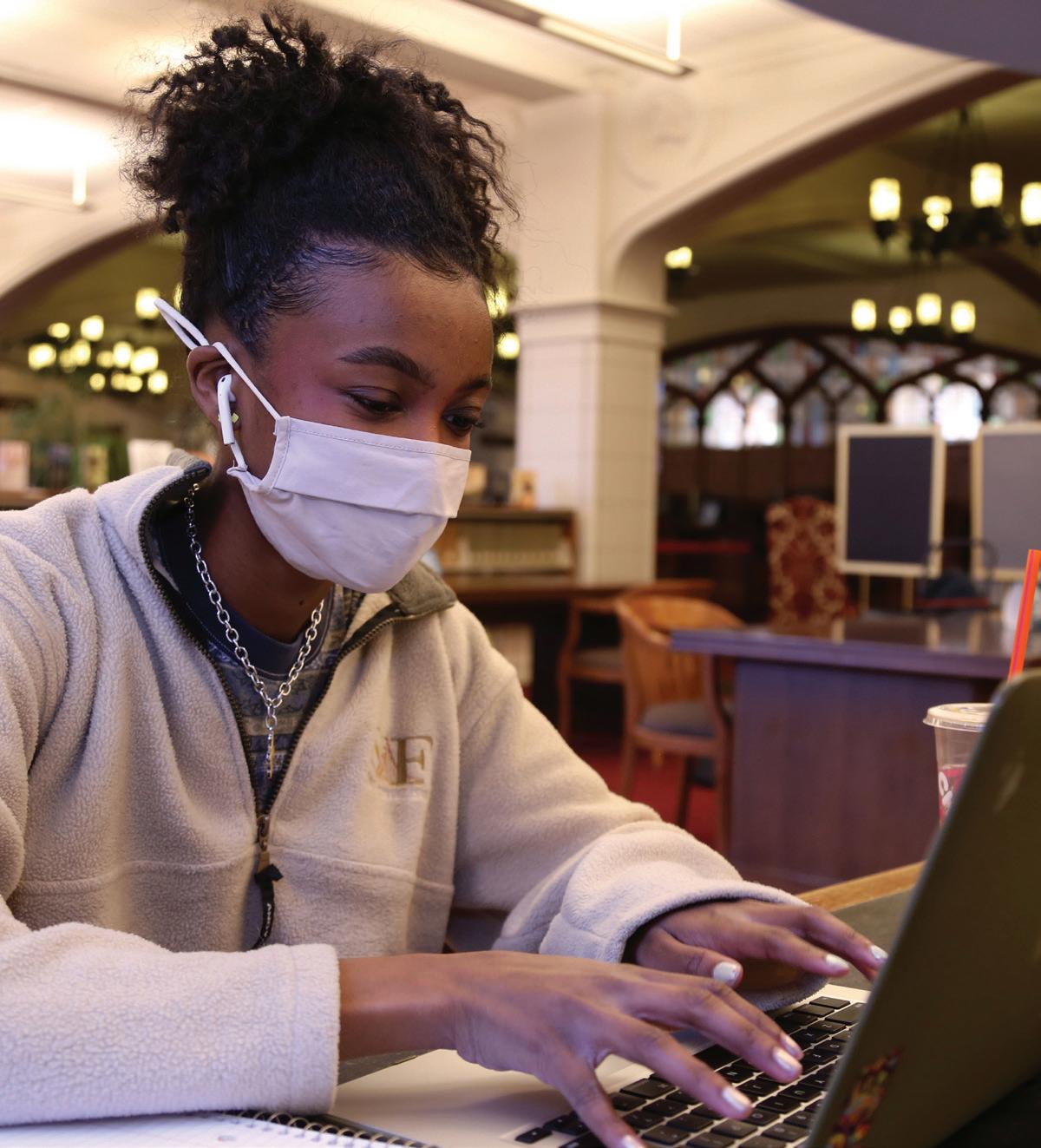

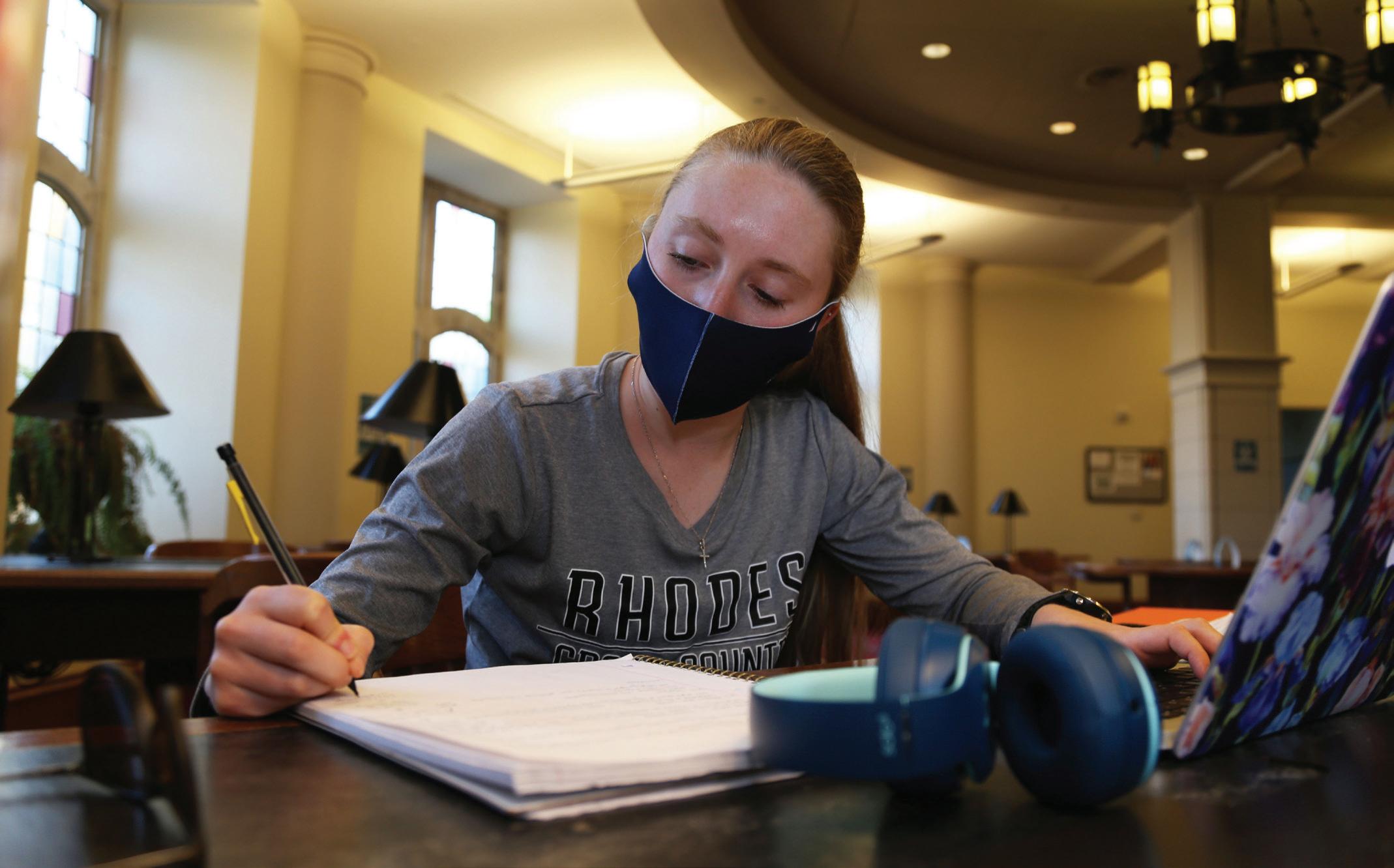
Mike Herbers, Master Plumbe Anna Johnson '23
Chloe Christion ’22
Rhodes. “Applications are up,” he says. It’s always good to be up rather than down, so we’re pleased that we have the response we’ve seen thus far.” Since it’s still early in the admissions cycle, the college plans to stick to a normal schedule when it comes to accepting the freshman for the fall of 2021 ( freshman who will make up the class of 2025). “We’ll make offers of admission on our normal schedule, and we’ll certainly be working closely with families of students who have been admitted to encourage them to come to Rhodes,” says Thompson. “They’ll have until May 1st next spring to make those decisions, but so far, so good. However, it’s hard to know what exactly will happen because we don’t have anything to compare this against.”
While numbers are up now, Thompson doesn’t take them for granted. As a private college, Rhodes is entirely self-financed, making tuition payments even more critical to the college’s current model. But the pandemic put a preplanned change in tuition on hold. Rhodes had intended to introduce a slight tuition increase earlier this year to help cover the cost of a health and safety plan for students. But with the fall semester deemed too risky for students to be on campus, the school pivoted to a 9 percent tuition reduction for the semester, dropping the price to 2017’s rates.
Going back to the NYU professor’s study, Rhodes succeeds through his criteria by extending a wide net for prospective students. And the school’s good name brand equity makes it easier to attract outof-state students, as well as create a healthy group of international applicants. All of that feeds into Rhodes improving its core missions through the recently implemented ten-year strategic plan, and even taking the pandemic into account, Hass believes it’s still the best course to follow.
“Our strategic plan was grounded in extensive research,” she says, “and we are still preparing to move forward with it.” The Planning and Priorities Task Force was asked to review the plan, and while there might be a few changes ahead, its main focuses remain the same. “For example, we’re going to move forward full speed ahead with building a new residence hall and moving to a three-year residency,” explains Hass. “We think that’s great for students. It’s great for building a culture of belonging and it’s helpful for our financial strength.
“We’re going to see a faster move towards the interdisciplinarity that our plan called for,” she continues, “as smaller departments align themselves with each other to be more efficient in their management.
“We will see quicker movement towards inclusive excellence projects. At Rhodes, the population ahead is more diverse and focused on finding a place where the on-campus student life experience is welcoming and is supportive. So this was really what that committee was doing: prioritizing what was in our strategic plan and asking, ‘where do we start?’ And they really came back and reaffirmed the basic core tenets of the plan, and reaffirmed certainly the commitment to academic excellence.”
And that forward-thinking strategy is what makes colleges like Rhodes successful. Galloway wrote that “creative solutions can be found. Explore all options, instead of being in denial. Denial is more expensive than facing reality.” That ethos was encapsulated earlier this year by President Hass, who gained national attention after making an early decision to pursue remote learning for the fall semester, at a time when many college leaders were unable to pull the trigger either way.
When research and projections indicated it would be too risky for the school to reopen, Hass quickly charted the school’s path forward and embraced virtual teaching technology for the school. It was a tough decision, to be sure, but an early and creative one that gave the college its platform to thrive.
“Everything the Rhodes community does now will help us preserve the college’s strength over the long haul,” says Hass. “Rhodes has been here for almost 175 years, and we’re going to be here for another 175 years, and another 175 beyond that. It’s the college’s responsibility to think not just about this immediate moment, but building the future.”
Rhodes Announces 2020 Alumni Awards
Chloe HakimMoore ’16
The Young Alumni Award is presented to a young alumnus or alumna who has not yet reached their tenth reunion year and who has brought honor to Rhodes through extraordinary achievement in their profession and community.

Born and raised in Memphis, TN, Chloe Hakim-Moore ’16 has devoted her electric career to uplifting the goodness and tapping into the potential of Memphis. In February 2020, she delivered a TEDx Talk that outlined how her time in college shaped her commitment to wellness, and how that commitment is the foundation for her life’s efforts.
For her work thus far, HakimMoore was named to the Forbes “Top 30 under 30” list in Education, the Memphis Flyer’s “20 under 30,” and the Urban Elite Professionals’ “Top 40 under 40.” She was also awarded the Salzburg Global Seminar’s Young Cultural Innovators’ fellowship to expand peace and well-being globally.
Hakim-Moore is an internationally acclaimed social designer, artist, and humanitarian. She designed and leads NEXT Memphis, a $32 million initiative of Porter-Leath to equitably increase access to high-quality early childhood education for all families in Shelby County
Her past projects include: • Leading the operations of First 8 Memphis to serve all children and families with high-quality early childhood education programming • Partnering with the National
Institutes of Health to serve persons with disabilities in
Trinidad and Tobago • Supporting refugees and immigrants through designing citizenship attainment and food entrepreneurship opportunities.
In the community, HakimMoore volunteers as the board chair for Apple Seeds, Inc., a maternal mental health nonprofit, and serves as the public policy co-chair for the Tennessee Association for Children’s Early Education. In addition, due to her leadership in the nonprofit space, a local philanthropy approached Hakim-Moore to lead the Covid-19 disaster relief for childcare in Shelby County.
Had it not been for the incredible instruction and consistent care from faculty mentors, she would not be working in the lanes of systems change and social movements which are her calling. The guidance from Rhodes College, and specifically the Anthropology and Sociology Department, equipped HakimMoore with a compassionate lens and well-versed skill set to catalyze meaningful change and inspire hope in the city she loves dearly.
The three annual alumni awards, traditionally presented at Alumni Convocation during Homecoming/Reunion Weekend, were announced November 6th. Chloe Hakim-Moore ’16 is the recipient of the 2020 Young Alumni Award, Melanie A. Hillard ’92 has been selected as the 2020 Black Student Association Distinguished Alumni Award, and Allen Reynolds ’60 is the recipient of the 2020 Distinguished Alumni Award.

Melanie A. Hillard ’92
Established in 1998, the Black Student
Association’s Distinguished Alumni Award
recognizes African-American alumni whose record of outstanding personal achievement and service to others has inspired Rhodes students and brought honor to their alma mater.
A graduate of the historic Little Rock Central High School, Melanie A. Hillard ’92 received her B.A. in Business Administration from Rhodes College and obtained her M.B.A. from the University of Arkansas at Little Rock. In May 2015, Hillard was awarded an Honorary Doctorate in Humane Letters by Shorter College, North Little Rock, AR.
She has been employed by Eli Lilly & Company since 2003. As a top performer, she was promoted to executive sales representative in the Diabetes Specialty Division, and currently serves in the Connected Care & Insulins business unit. She has received many awards, including MVP, Market Leader, and Partnership awards.
While at Rhodes, Hillard was initiated into Alpha Kappa Alpha Sorority, Incorporated, and became a charter member of Omicron Chi Chapter (Rhodes College, Memphis) where she later served as president. She transferred into Beta Pi Omega Chapter in Little Rock, AR, after graduation and has served the sorority in many capacities and all levels, including chapter president from 2015 to 2018. She was awarded the Outstanding President’s Award during the 85th South Central Regional Conference. During her tenure, the chapter’s membership grew and won numerous regional and international awards for its service and mentoring programs.
Hillard was recently appointed by the South Central Regional Director to serve as the Arkansas Cluster Coordinator for Alpha Kappa Alpha Sorority, Incorporated, South Central Region. She was also appointed by the current International President, Dr. Glenda Baskin Glover, to serve on the International Investigations Committee as a regional investigator.
She is deeply committed to the betterment of her community. She serves on the Board of Directors for the following organizations: the Arkansas Repertory Theatre, Arkansas Zoological Foundation, the Ivy Foundation of Little Rock, and the Rhodes College Alumni Executive Board. She also served as the 2018 Event Chair for the Walk to End Alzheimer’s.
Hillard is an active member of the African Methodist Episcopal Church, 12th Episcopal District, and serves Union AME Church, Little Rock, AR, faithfully on the steward board as a pastor’s steward and the Hattie Davis Missionary Society as the first vice president. She also works on the conference level as the Arkansas Conference Scholarship commissioner.
Hillard has been married 25+ years to her best friend, Jessie C. Hillard, and they have been blessed with two amazing sons, Allen and Elliott, who are kind, intelligent, and God-loving young men. Hillard has a true heart for service and believes that “service is simply love made visible.” Above all, she says she tries to live by the scripture found in Micah 6:8: “He has shown you, O mortal, what is good. And what does the Lord require of you? To act justly and to love mercy and walk humbly with your God.”
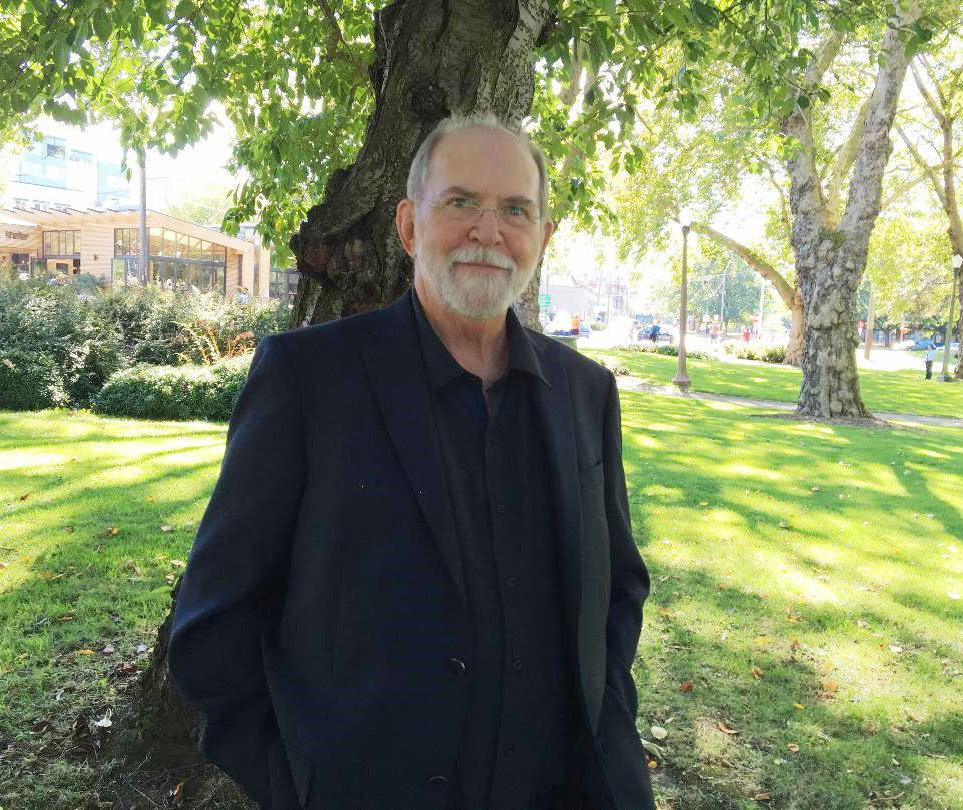
Allen Reynolds ’60
The Distinguished Alumni Award recognizes an alumnus or alumna who has brought honor to Rhodes College through extraordinary achievement in his or her profession and community. If you’ve ever caught yourself dancing impulsively to the contagious beat of “Five O’Clock World” or consoled your broken heart by listening to Waylon Jennings sing “Dreaming My Dreams With You,” or have adopted Crystal Gayle’s “Ready for the Times to Get Better” as your 2020 anthem, you have Allen Reynolds ’60 to thank.
Before becoming a world-renowned music producer and esteemed member of the Nashville Songwriters’ Hall of Fame, Reynolds was a campus leader at Rhodes College. A native Memphian, he joined the Rhodes College community after graduating from Central High School just a few miles from our campus. He was elected president of his freshman and sophomore classes, and student council president his senior year. He was a brother of Sigma Nu Fraternity, elected social activities commissioner, named Omicron Delta Kappa Outstanding Sophomore, took the title of “Mr. Talent” his senior year, and was honored by his peers by being named to the prestigious Student Hall of Fame.
In addition to all of his on-campus activities, the English major was also pursuing his dream of music and sharing his talents with the greater Memphis community. In 1957, he recorded the single “Dream Boy” with Memphis State student Dickey Lee and several of his Southewestern (now Rhodes) fraternity brothers, including David Glenn ’60 and former Rhodes trustee, the late J.L Jerden ’59. The group was known as Dickey Lee and The Collegiates. The song received airtime from Memphis deejay Dewey Phillips, the first to play Elvis Presley’s record on the radio. Phillips was so impressed with the group, he encouraged Sam Phillips (no relation) to record them at famed Sun Studios.
While working at Sun, Reynolds met songwriter and producer Coyboy Jack Clement. Eventually Reynolds and Dickey Lee followed Clement to Beaumont, TX, to work in his studio. There Reynolds co-wrote Lee’s Top 20 pop hit “I Saw Linda Yesterday” as well as “Don’t Wanna Think About Paula.” In addition to working in Jack’s studio, Reynolds also worked part-time managing the nightclub at the King Edward Hotel, where he performed twice a week.
After a few years of working part-time jobs to supplement his music career, Reynolds returned to Memphis and joined First National Bank, where he was a banker by day and songwriter on nights and weekends. It was during this period that he wrote “Five O’Clock World,” a pop song The Vogues took to No. 4 on Billboard’s Hot 100 in 1966.
Reynolds, who found himself drawn more and more to country music, finally decided to leave banking in 1970 and move to Nashville to pursue his music dreams full-time. He joined one of Jack Clement’s studios and wrote, produced, and managed the JMI record label that Jack had established.
When JMI Records folded in 1975, Reynolds purchased Clement’s studio Jack’s Tracks on Music Row and became an independent producer. One of his first clients was Crystal Gayle and together, they would record ten albums. Five of those albums went gold, selling 500,000 or more albums, and two went platinum, selling more than 1,000,000 albums. Seventeen singles from the albums reached No. 1 on the Billboard singles chart, including Crystal Gayle’s career-defining crossover, “Don’t It Make My Brown Eyes Blue.”
In addition to Crystal Gayle, Reynolds also produced five albums for Kathy Mattea, who went on to twice win the Country Music Association’s Female Vocalist of the Year Award and a Grammy as Country Female Vocalist of the Year.
But Reynolds’ most successful client was Garth Brooks. He produced all of Brooks’ country albums, which together have sold more copies than those of any other artist in country music history. Nine of the albums were certified diamond, meaning each album sold more than 10 million copies.
While Reynolds has achieved great commercial success as a producer, he has also written a number of country music classics. His songs have been recorded by Johnny Cash, Jerry Lee Lewis, Chet Atkins, Brenda Lee, Don Williams, Waylon Jennings, Kathy Mattea, Hal Ketchum, Emmylou Harris, Allison Kraus, and the Cowboy Junkies, just to name a few.
Through his songwriting, Reynolds has captured heartache and loss, loneliness and longing, disappointment and regret, joy and happiness, love and hope. Most importantly, his songs have touched our humanity. His remarkable talent was recognized in 2000 when he was inducted into the Nashville Songwriters Hall of Fame and in 2016 when he was inducted into the Musicians Hall of Fame.
Reynolds’ music has touched millions of people around the world, broadening the appeal and influence of country music. His award-winning songs and ground-breaking work as a producer have helped shape the course of country music for more than three decades. And he has done all of this with incredible humility and a commitment to maintaining the highest standards.
In addition to his impact on country music, Reynolds has also impacted the lives of generations of Rhodes students who have benefited tremendously from his generous support and have, themselves, gone on to contribute to their professions and communities.



